|
It's something I've seen a lot lately- Fellow Zebras struggling with the frustration of an illness that is so misunderstood. Many of us will tell you (even after diagnosis) we don't understand the disorder, and almost every person with EDS has experienced doctors who don't understand our condition, or worse, who roll their eyes at our pain, or tell us in one breath that we should have our heart checked and in the next breath, that they don't understand what we're complaining about, that EDS is a "minor" condition.
I personally saw two orthopedists before finding the one who actually diagnosed me- one who told me that the "significant arthritic change" seen between the two MRIs I was given six months apart didn't tell him anything and didn't explain my severe pain, and that was it- he didn't want to see me back, he didn't believe I needed treatment for my pain and he offered no follow up... but believe it or not, the second doctor was worse; He laughed in my face. Prior to his laughter, I sat through an excrutiating appointment that my husband had driven me to. I calmly but tearfully explained how I'd gone from being a healthy active cop, loving my job despite struggling with my intolerance to the heat, and how, since my pregnancy, I could barely make it to the toilet twice a day because of how much pain I was in around the clock. I patiently explained as best I could, the severity of my pain, the constant cracking, sliding and popping of my joints. I explained how my hips. shoulders, one knee, and my fingers and toes, were dislocating around the clock from the most minor of movement. He barely said a word during this interview before my "exam". I told him that an orthopedist who no longer accepted my insurance had suggested the cause of my problems was Ehlers Danlos Syndrome, and that my joint pain had severely worsened after stints in the hospital where I was treated with ciprofloxin and levoquin.... And then in one breath he dismissed my pain like I had finally reached the punchline of a long joke. "First of all," he started condescendingly- " Ehlers Danlos Syndrome is very rare. You don't have it." (Mind you, he hadn't laid a hand on me to examine me, he hadn't reviewed any of my films, nor did he take ANY family history)... But that didn't stop him. "Second - Ehlers Danlos doesn't cause ANY pain, and certainly not the "severe" pain like you are claiming to have." He made sure to stress the word CLAIMING. At this point, my mouth was hanging open from shock, my husband, thankfully with me for that appointment was speechless. Oh, but he wasn't - he went right on, "And how do you know you've dislocated something?" he chided me, clearly amused. "I wasn't made aware that you have a medical degree." The Physician's Assistant squirmed, visibly uncomfortable. He was stunned, speechless and glanced at me sympathetically between staring HARD at the floor.. The "doctor" continued to belittle me for several straight minutes, asking questions he didn't allow me to answer and quoting "facts" about how I don't have any of the "physical features of someone with EDS". (He was mistakenly listing symptoms of Marphan's Syndrome, a similar condition that, similar to Downs syndrome, has visible physical traits). He went on to tell me that with no history of heart issues (I remind you, he took no family or health history, so he had no idea I DO have a history of heart palpitations and a diagnosed murmur.)- but he was VERY SURE that I couldn't possibly have EDS. And with that, he literally dismissed me with a wave of his hand and WALKED OUT OF THE ROOM. telling me as he walked out that he had, and I quote, "Real Patients with REAL problems. You know, like broken wrists." His PA offered some consolation: He did believe my pain was real. He admitted that he knew nothing about EDS and that the "doctor" clearly didn't either. He told me that the doctor "really only deals with things like broken bones" and probably isn't the type of doctor I'd need (understatement of the year!). I've never cried in front of a doctor, but that day I did. I left frustrated, angry, and I believe that was when I first said it; "I wish I had cancer." How could anyone think or say such a thing, right? But allow me to explain. When you are told you have cancer, a doctor sits you down and gives you a serious diagnosis. They generally treat you, and your family, with compassion and understanding that the words they are telling you are about to change your entire life - and quite possibly your lifespan, and most definately, the quality of that life for some period of time. When you are diagnosed with cancer - 99% of the time, you have a disease with a name and some type of understanding. In the moment that I spoke those words - I was thinking so many things. Here is a discussion of the comparison between cancer and Ehlers Danlos Syndrome. I apologize for my blunt-ness, and please know that in NO WAY am I trying to claim that anyone "wishes" to have cancer, or is down-playing the devastating ways in which cancer destroys lives. EDS, though, is an ugly nightmare: It has no cure- it lasts forever, it never gets better, but it probably won't kill me. Cancer VS Ehlers Danlos Syndrome Seeing Doctors / Recieving Treatment for Pain Lifespan and Quality of Life Expectancy - With cancer, generally, you either get better or you die. One doesn't generally develop cancer, and live with it for seventy plus years. Most often after diagnosis, cancer is either treated, or, in the tragic cases, it can't be, or the treatments available aren't successful. Either way, the most common likelihood is that within a few years or diagnosis, you will either be cured, in remission, or have succumbed. Most types of cancer are either flat-out terminal or treatable - but either way, doctors usually have SOME information about what you can expect, both short-term and long-term. VS - With EDS, *if you even get a diagnosis* some SEVENTY FIVE percent of the doctors you'll see after that diagnosis will have little to no understanding of what EDS is, how it impacts its victims, how or if there are any ways treat its PLETHORA of symptoms, and many doctors flat-out insist that EDS doesn't cause pain because they can't point to it on an xray. A person with EDS will generally continue to physically deteriorate for their entire life, with new symptoms coming on, and present symptoms worsening or constantly changing. Only one kind of EDS is USUALLY terminal (type 4, vascular, which can and often does affect a person's organs. ) - the rest of us can expect to live a fairly long "normal" lifespan.... most of which will involve constant symptoms and ongoing suffering. Being Tested and Diagnosed - You can be tested definitively for cancer. Tumors can be seen on scans and x-rays and some can by physically cut away from the body. No one doubts cancer exists or dismisses it as "minor." VS. - There is no genetic test for the most common type of EDS (hyper-mobility type - or Type 3 - it can only be diagnosed by completing a physical assessment AND by taking a long, complete medical history and a complete family history. They have to look at the extensive list of symptoms and determine if you have a certain number of possible symptoms *and then* rule out all other conditions that are likely or possible to CAUSE those other conditions - so lots of expensive blood tests, scans, xrays and biopsies, all of which will, with EDS, show doctors NOTHING.. EDS can't be diagnosed on any xray, MRI or other scan, it doesn't show up on a blood test. We don't even know what gene causes the most common type. So pretty much.... good luck getting diagnosed! Seeing a Specialist - If you have cancer, you'll need to see an Oncologist. Oncologists are specialists who treat cancer and cancerous tumors - there are THOUSANDS of cancer specialists, and the United States along has THOUSANDS of hospitals as well as entire medical treatment facilities that cater to cancer patients and assisting their families. There are nonprofit pediatric cancer centers where patients and their families receive treatment free of charge through donors and there are thousands of charities raising money for the MANY types of cancer. Cancer is the single most well-funded medical research topic and a cure for cancer is the number one priority of no less than THOUSANDS of scientists. If you have cancer, you can be seen in ANY hospital or by ANY doctor, and there is NOT ONE physician on the planet who doesn't know what cancer is. VS. - If you have EDS, no one is quite sure what type of doctor should diagnose EDS, let alone treat us. Let's be real - the human body is FULL of connective-tissue, and if your connective tissue is faulty, which is what EDS is, you're going to need a doctor who can treat the symptoms you're dealing with. Wait - did I say *A* doctor? Nope: Try MANY doctors. Oh, and don't forget - you'll have to try to find one who knows what EDS even IS and it's likely they have never even have heard of EDS before you came into their office. You'll need:
I think that's most of them.... Being Understood / Your Friends & Family - If you have cancer, you will have the utmost in sympathy from anyone who finds out. Cancer patients are often given the highest degree of respect and understanding because everyone knows how serious and devastating a cancer diagnosis is. No one yells at a balding cancer patient as they walk into chemo treatments from their handicapped parking spot - and you can be sure that your friends and family will LIKELY support you in every way possible. If you look exhausted and sick and tell a perfect stranger you have Cancer, they typically understand immediately your struggle. No one will expect you to "fight through it" - and you can expect to be understood and received with compassion and care most of the time. VS. - I shared this frustration when I was at my rock bottom-i was pre-pain management, I was in worse pain than child birth, 24/7, and i couldn't take much more.... I believe my exact words were- "If I had cancer, at least there would be an end in sight, death or remission." If you have Ehlers-Danlos Syndrome, there's a good chance that you look fairly "normal" and many of us, especially early on, do not have any highly visible medical devices. Limping could easily be faking, and when you're not up to getting out of your pajamas, or when you park in a handicapped spot and you're under 50, you can expect to be interrogated by perfect strangers. Your family MAY support you - until you miss a big planned event or fall behind on helping around the house, and then you may find that no one REALLY believes you're ill. After all - no one can SEE broken connective tissue, so how do they KNOW you're really in pain, exhausted, and feeling horrible all of the time? I have the single most supportive husband I've ever met - and even he has occasionally suggested that I should try to "do more" or loses his patience when I've had several bad days in a row and can't keep up with things. MOST people with EDS aren't as lucky, and many of us have very little, if any, actual support from loved ones, since EDS is so misunderstood. Strangers will very likely have ZERO CLUE what EDS is - so you'll either need to give a long-winded explanation or expect that they simply won't have empathy for your situation. You can expect to hear things like "But you don't LOOK sick!" or "But yesterday you were able to go to the grocery store and lift a bag of dog food, but today you can't even get out of bed?" Seeking Treatment - Have you ever heard of a doctor saying to a cancer patient; "Sorry. Not sure who to send you to or if there's anything anyone can do for you." Hell no. If it's incurable and terminal, at least they can be informed- but many of us are left with way more questions than answers! Cancer patients were some of the first to be granted access to medical marijuana, and in all fifty states, provisions that limit the treatment of people with opiates and other powerful pain medications exempt cancer patients - after all, cancer is VERY painful for many people, and of course that pain deserves to be treated in the best way possible, right? The side-effects of cancer treatments are well-understood even by people who have never known anyone who's had it, because cancer is all over tv shows, movies and in the media. VS. - Many of our own doctors have left patients to Google "what is Ehlers Danlos Syndrome" after diagnosis, leaving us to imagine the worst, and giving us no direction or support after telling us "Hey, you have an incurable and permanent illness that will never get better and will likely get much worse." Unless you were a big fan of House, you've probably never heard Ehlers Danlos Syndrome said on television, let alone seen anyone in any sort of film who's living with it. Going to the ER? Or a new doctor? When you tell the doctor there that you have EDS, half of them will roll their eyes at you or flat out say they have never heard of it. Most won't realize that this means certain antibiotics are off-limits, or that anesthesia and pain medications likely won't work properly, among dozens of other concerns they should have about how to treat you. Many of us wish we could at LEAST have our pain validated by random strangers when we feel our worst, but the reality is that most people will have never heard of our condition or have ANY idea of the plethora of ways it negatively impacts your life. Sorry. So... What Are My Options? - Cancer at least, most types, have treatment options. Even if it's not a guarantee- there's a chance surgery, medication, radiation, chemo, could cure you. If you HAVE a treatable kind, but the treatment would be extensive, dangerous, or destroy your quality of life, you have the right to deny treatments and you can choose instead to die. Cancer that CAN be treated, often has a variety of treatments from surgeries to medications, radiation, chemotherapy, transplants, tumor removals, and many many more. When you are diagnosed with cancer, doctors make plans, follow-up appointments, surgery dates. You are offered support services, counseling, and a host of charities offer transportation, funding, even help for your living situation while you're in treatment. VS. - EDS patients have no options. When you are diagnosed with EDS, Doctors pretty much say "Okay... so, now we know what's wrong. But... why are you here? There's nothing we can really do for you." Many doctors are very hesitant to give pain medications, since many are often ineffective due to our genetic predisposition for them to not work properly - and even the medications that do work only do so for a period of time before they stop... which means that many doctors want to hold off even if your pain is EXTREMELY severe - because eventually, you'll run out of medications to try. There are NO treatments for Ehlers-Danlos Syndrome. The only thing they can do is try to assist with individual symptoms. I know that if many of us could give up a breast, or a limb, or even our reproductive organs or to have major brain surgery, or a very painful bone marrow transplant - we would jump at the chance to be allowed to return to an illness-free life - but none of that is possible. EDS is forever. ER Treatment? - If you have cancer, you can go to ANY hospital, and expect prompt treatment and immediate concern- even if all you are is nauseous from recent chemotherapy. You'll be admitted long enough for whatever treatment you need, and your concerns will be taken seriously. VS - If you have EDS, you will LIKELY be treated like a psych patient or a drug addict, almost four times as often as you'll have your concerns heard, your pain treated appropriately, and even when you ARE treated like a human being, there's likely not much that can be done for many of the most common symptoms. Sure, they can reset your dislocated (insert joint here) - but they will likely send you home without pain medication, and that joint may very well dislocate again before you leave the parking lot. Best of luck. :-/ Treating the Mind and Body - If you have cancer, there's a good chance that your doctors have already spoken to you about things like positive thinking, and may have sent you to a psycologist for an assesment of how you're coping with the news of your diagnosis and how you're handeling treatment. There are yoga groups and massages designed specifically for those undergoing cancer treatments and everyone agrees that spiritual health is so important. VS -If you have Ehlers Danlos Syndrome, one of the most common things you'll face first is being prescribed physical therapy- yet most physical therapists want to treat us like everyone else- and things like stretching, yoga, strength training- these OFTEN only serve to WORSEN our condition and pain. Yoga and any stretching can cause pain and worsening dialocations and few doctors truly understand that Ehlers Danlos Syndrome is ALL CONSUMING and affects ALL areas of our lives, so often psycologists are only suggested if they suspect we're exaggerating or faking our symptons entirely! We can tape ourselves from head to toe, wear every splint and brace known to man, get a service dog, handicapped tags, use a wheel chair, a shower stool, but in the end- there's no treatment for EDS. There's pain management for those of us lucky enough to have doctors who care and understand- and there's coping. That's all there is for us. Sure, it may be a case of "The grass is always greener ". Sometimes, when you are suffering endless frustration, dismissal from doctors, hell, not even a real diagnosis (I'm still waiting, over three years in, for disability income- if it wasn't for family and my husband, I'd have starved to death or committed suicide by now), so I can't IMAGINE how people who are more broke and who have LESS family support are able to handle this disorder. It's no joke. Many of us suffer, day in, and day out, with severe pain that's akin to a cancer patients' suffering, and when we visit doctors, they tell us " EDS doesn't cause pain " or that were "drug seeking". If you had cancer and asked for pain relief- do you think any doctor would roll their eyes at you or claim you're not actually IN that much pain? I'm in no way trying to trivialize cancer. Like many EDSers, I'm just hoping and wishing we might be more understood and have similar hope for things to be getting better, instead of just worse. So if you hear a chronic pain patient compare their journey with that of Cancer, please try to understand... it's not that we are trying to say that EDS is WORSE than Cancer -it's just that, simply put- everyone knows what Cancer is. Even little children see commercials and know it's a big scary illness. It comes down to this - no one wants to have cancer or Ehlers Danlos Syndrome. All we want is a little more compassion and understanding of what we deal with 24/7. I wish there was a way to let people know "you should look for all these weird symptoms" and "If you're finding that all these strange things are happening to you - you MIGHT have Ehlers-Danlos Syndrome" - while the EDNF site is really good, much of the symptoms listed are just medical terms,and not necessarily things people can relate to. I know there's a lot of things MANY of us have, but it doesn't seem as if doctors have 110% connected it to our EDS.... like Keratosis pilaris (red bumps on your skin on your arms and legs most often, which can appear purple when you're cold - it's common among EDSers). I'm trying to catalog all my problems from head to toe...I hope it will help my doctors (I'm planning to give it to them), plus, I'm hoping you guys reading who suffer from EDS can help do the same, so we can make a generalized "If you're noticing that you have a large number of these problems, you might want to talk to a geneticist." Here are the things I've come up with from a thorough evaluation - but this list isn't complete and I'm sure I'll be adding things as I remember them. My EDS related symptoms - from head to toe - starting with things noticed when I was a baby: As a Baby: -I was born with hips that seemed to have no natural stop - they were extremely floppy and could bend in every direction. By the time I could stand, i could and would often rotate my legs inward almost 360 degrees. I can STILL do this. -I was very ahead of my age physically. I never needed my head/neck supported as an infant bc i could hold it up myself. - as a baby, I had incredible strength and could hold my head up and do push ups. I stood at four and a half months, pulling myself up, and then walked at barely over five months. -(I've noticed a large number of these things in my son who is now four - he was incredibly ahead- crawling from the foot of our bed to the head at only 13 weeks - and the day he was born, he could lift his entire top-half into a push-up position and look ALL over the room, holding himself up for minutes. It freaked out the OBGYN so badly, he at first thought the baby he was seeing in our room WASN'T the one I'd just given birth to downstairs. He called in over a dozen people to witness the super-human baby whose head/neck and arms were SO strong. -I was always a very advanced learner. Spoke in full sentences before 18 month, was reading full books by three, and chaptered adult books by four and a half. I was offered to skip multiple grades in school (but passed to stay with my friends). -I was VERY clumsy as a kid, with horribly toed-in walking, I tripped over my own feet often and they tried to put bar-shoes on me, but had to remove them because I walked so young. -As a child, I always felt like my joints were SUPER loose, and I always felt like just sitting up /standing in line, etc was EXHAUSTING. This has only gotten much worse as I've gotten older. Head / Hair / Brain: -I'm a natural red-head with fine skin and freckles, which seems to be pretty common in EDS type-3. I've seen a LOT of red-heads. -Accelerated Hair growth (my head-hair grows nearly 1.5" a month) -Thin, fine, limp hair with a permanent part no matter what I do - my hair won't hold a perm, and resists dye. (This could be because of my red hair) -Brain-fog, short-term memory problems with functional things- like I can't remember if I did something, or WHEN I did something. It's like my body doesn't remember what it's done. HOWEVER... -I have incredible long-term memory - I can even remember many things that happened when I was just 8 months old in detail. AND - I have an Eidetic memory for things I read and see. I can flip through a magazine, and then tell you what page the razor ad was on, or almost repeat an entire article word for word. (For example: No one has EVER beat me at that bar-computer game where an image flashes, the faster you touch the screen, the faster the picture goes away, and then it asks you a bunch of questions about what you just saw - like how many spoons were on the table, or how many people were wearing sunglasses - to date, I've never gotten a single question wrong because my mind forms a complete photo almost instantly of what I saw, and I can recall it in incredible detail) - I read incredibly fast and can type over 165 wpm -ADHD symptoms that started in middle-school with impulse control issues, inability to sit still (which i still think was due to pain/discomfort/always looking for a more comfortable position - not necessarily hyperactivity) -Oddly, I've almost never had a head-ache in my life, save a few times when I was really sick and had sinus pressure. (I realize how lucky I am). Skin: -I have keratosis pilaris on my upper arms, thighs (above my knees on both upper legs) and along my jaw line. It causes the pores to get plugged up and red bumps. On my face, it causes bumps almost like acne but it's clearly not. -I have a horrible time with picking, especially at my face because I cant stand that just washing/exfoliating doesnt clear it up, so I often pick, poke, squeeze, etc. The doctor can tell me all he wants that it makes it worse, but I cant stand having anything IN my skin. -I have VERY fine blonde body-hair that's totally unnoticeable and almost invisible. As I hit my 30's, this fine peach fuzz has shown up along my jawline, my upper lip, and below and around my mouth - where the plugged skin is worse. Even though it's all but invisible, I've found that shaving it can help exfoliate the skin and does help. -I soak in Epsom salts and exfoliate with apricot-shell and loofah oatmeal soaps which help reduce the keratosis pilaris. -An illumask from Walmart REALLY helps with my skin on my face, to reduce redness, and Lotrimen (not because it's a fungus, but because the medication helps to break down the keratin plugs that form under the skin), and breaks down many of the painful lumps before they begin. I HIGHLY recommend this combination! Eyes: - I've never needed glasses, until my 30's - because my night vision and depth perception have become awful, very rapidly. - I am red/green deficient from a head injury that happened when I was playing soccer at 13. -I have floating spots that started when I was 31. Nothing is wrong with my eyes and doctors have yet to get an answer to why. It gets worse and then goes back to a minor inconvenience, but it never totally goes away. The spots seem to remain in the same spots, though sometimes they get larger and return to a small size. These floaters often make me think I'm seeing a bug or something in my vision, takes a second to remember it's just my eyes. Anesthetics / Surgery Issues: - Almost no general anesthesia works properly - it either wears off really fast or doesn't knock me out even in large doses. This has been observed by over a dozen different doctors. - I've woken up during various surgeries, and my epidural wore off in less than 20 minutes - they barely had time to finish my tubal ligation, and I was fully able to move my legs before getting to the recovery room. -Local anesthetics don't work at all- for dental procedures, I've had hundreds of shots, which sometimes numb near my eyeballs and parts of my upper face, but don't do anything for my mouth/teeth. I can feel almost all dental work if I'm awake. -Pain medication does not work normally either, I can have abnormally large doses that someone my size shouldn't metabolize so quickly or be able to handle without seeming "high" or out of it. No one in my life except my family would have ANY clue that I take 100 mg extended release morphine every 12 hrs and 4 mg dilaudid for breakthrough pain because it doesn't affect my behavior or coordination at all. Even my eyes don't dilate severely like most people's do. Mouth / Jaw / Teeth: -Jaw locking problems - pops if I open wide enough. TMJ symptoms since I was a young teen. -No dental anesthetics work or last. I've had HUNDREDS of shots of varying local anesthetics and I can still feel everything. -Dental pain seems to affect me abnormally badly to the average person. -I used to get a lot of mouth ulcers (NOT cold sores - little round open wounds inside my mouth, on my inner cheek, inside my lips, on the gums, tongue, under my tongue. Adding vitamin C to my diet seems to have worked to reduce these. My mom and son have the same problem.) -Very high pallet -Very crowded teeth with no room for all my teeth - had to have some pulled. Had braces for a few years because my teeth were crossing, and they moved immediately as soon as my retainer broke. Even though I now have some missing teeth - the teeth crowd together. -My baby teeth never fell out and had to be pulled. I got my first loose tooth at NINE. Two of my baby teeth lasted until I was twenty four. -I was missing eight adult teeth - one of my wisdom teeth and several of my other teeth both front and molars simply didn't exist. - My jaw was broken when my wisdom teeth were pulled because the doctor must have not realized that my jaw would just dislocate when he opened my mouth far... my guess is that it easily dislocated from manual manipulation, and he just opened it too far and my jaw bone cracked length-wise. It was a LONG healing process, caused huge swelling and eight weeks of being unable to open my mouth. We had to pry my teeth open with a spoon to put pain medication in - no joke. -While I was pregnant, my teeth which had NEVER had a cavity my entire life, suddenly began to crumble. Since then (I'm 33 now) - I've lost seven teeth, have two that are beyond repair, and have about a dozen untreated cavities. Fillings seem to fall out, and while root canals do kill the nerve- the teeth can't seem to last after, and regardless of caps, crowns, etc - every tooth I've had a root canal in, has completely fallen apart. - Since this list was made, I had all of my molars pulled by an oral surgeon. The only teeth I have left are thirteen of my front teeth and those are breaking and will need to be pulled as well. :-( Thyroid / Fatigue / Insomnia My thyroid was diagnosed as slightly low functioning at 29 while I was pregnant, but not low enough for medication. By 31 I was low enough to need medication. -The thyroid issues cause horrible fatigue - even when I take my medication properly, I still have issues with fatigue that's impossible to counter-act without medication (I take 30 mg Vyvanse which helps with memory-fog, short term memory, impulse control AND helps give me the energy to stay awake 12-16 hrs a day) -I have waves of insomnia that I've yet to solve. I will not sleep normally for weeks, and then be unable to do anything BUT sleep for days. Vyvanse helps immensely but has severe side effects for the first 7-10 days on it and is VERY expensive.) - Thyroid issues can and have affected my ability to have a second child, and we are now being treated for unexplained fertility issues five years after the birth of my son. Neck / Throat: - I have problems swallowing, and at times get a lump in my throat that I can't swallow. It lasts for hours, days, sometimes weeks. Doctors tell me its GERD but I've got no other symptoms of heartburn. Simply a lump that shows up for no reason and wont go away. - I was finally diagnosed with an incompetent esophageal sphincter during an endoscopy recently - so apparently some stomach acid IS corroding my throat. Spine / Back: -Horrible posture - I can't sit up straight, feet on the floor, back straight for more than 40 seconds. I slump, I put my feet up on everything, I sit with my feet tucked under me or up on the dash - on the computer, I sit like a pretzel - it's almost absurd the positions I will get into to get "comfortable" - it's like my body naturally looks to rest on itself - even when I was a police officer, at the range, I'd hold my elbows against my belly to shoot, because holding my gun up was EXHAUSTING. -I have horrible muscle spasms and knots in my back. Myofasical release massage helps IMMENSELY but only lasts 2-3 days or less because the spasms come right back. It's also really expensive, so I'm lucky if I can get a good massage once a month, sometimes less. -To date, we've tried nearly every muscle relaxer that exists and none seem to work, OR they just knock me out for 16-20 hours which isn't practical. I'm not currently taking any muscle relaxers for this reason. I now have a prescription card in NJ for medical marijuana (as of July 2015) for muscle spasms, and it does help quite a bit. -I have horrible ongoing low-back and tail-bone pain. When I was a police officer, I would shove my metal ticket book behind my low back as lumbar support in my car which helped immensely. As a child, I would sit in weird positions to avoid back pain. As an adult, l spend a LOT of time unable to get comfortable - I used to sleep curled up, now I sleep on my back, but I've yet to find a comfortable bed/surface or way to sleep that reduces my pain. A pillow between my knees DOES help. I have since gotten several Yogibo chairs and pillows, which help a lot - I even sleep in my large Yogobi couch from time to time! -MRIs have to be upright because I'm terrible claustrophobic even with meds - they show some arthritic change but arent overly helpful because nothing is actively dislocated while the MRI is being done, so it doesnt show a whole lot. The first two orthopedists completely dismissed all my pain and problems because my MRI's didn't show any bulging disks, etc. GI: -I was diagnosed with crohns in summer 2008 while i was hospitalized on and off for seven weeks where I lived at the time. I still have specific foods, meds, etc that I avoid for flareups although some things (like fried foods) are just ALWAYS a no-no, no matter what. -I've been off medication since my pregnancy in 2010 - and have been in remission since around mid 2009 though I still have have some IBS type symptoms occasionally. -I cant take anti-inflammatories or NSAIDS as well other typical mild pain relievers. (the entire list is advil, tylenol, aspirin and naproxin) because they cause horrible GI pain, cramping and bleeding, and I'm pretty sure that's what caused or at least triggered the crohns to almost kill me in 2007. - I have tried EVERY exclusion diet, and skipping gluten, dairy, citrus, meat, carbs, sugars, carbonation, etc etc etc doesn't work. I have literally done each one, for months, with NO results - none of these benefit anything. -I have regular colonoscopies to be sure the Crohns is still in remission - the only problem is that - I had severe GI slowdown and even a blockage that required surgery while on oxycodone, so I got off of it - it did help with the chronic pain, but wasn't worth the awful effects on my GI. During the time on 15mg oxycodone, I gained almost 60 lbs, destroyed my appetite and sense of taste, and was constantly battling digestive problems (related to stasis). Female Related: - I had one pregnancy and it was fairly normal in 2010. - During my pregnancy, I was off all medication (I wasn't yet on pain medication as I was diagnosed with and my EDS got much worse at the end of, and after my pregnancy). My GI slowed down naturally, so the pregnancy almost seemed to "solve" all the problems with my crohns even though I'd stopped medications (I had done remicade treatments when first diagnosed, and later was on Asacol and Dicyclomine/Bentyl). - I have horrible cramps that seem to be worse when my thyroid works properly, but I do have very short periods and very irregular cycles that have proven impossible to track. - I was diagnosed with interstitial cystitis and have chronic and constant problems that feel like UTIs. I did have a problem with recurrent kidney infections which were solved with heavy IV antibiotic use - but the iv antibiotics caused permanent tendon damage (levoquin and cipro - at the time we didn't know that with EDS, I shouldn't be taking them). -The cystitis causes chronic UTI symptoms, and I take AZO about fifteen days a month to help reduce the pain/burning/urgency. It's especially bad during that time of the month and is a pain in the ass in relation to my marriage for obvious reasons (though my husband is incredibly understanding). Sometimes I take AZO as a preventative because I *know* the symptoms are coming back. -I have had awful problems with urgency, maybe I just wait too long to actually get up to go to the bathroom because of the chronic pain, but once I'm en route, its basically an emergency. - I tried to do both the bladder installations (where they put the medication right into your bladder) plus take the oral meds (elmiron and elavil),but the oral medication made me violently vomit and no adjustments help- I absolutely can't take them. The bladder installations don't last long enough to be worth the inconvenience, humiliation and constant risk of infection, plus, they leave me with the same pain and burning and I still have to take AZO. So I just live on AZO and I'm hoping it's not killing me. I THINK that's about it.... still adding to this as I think about more things... Footnote: Even if you aren't disabled, being pulled over by the police can be a nerve-wracking experience. If you are living with a disability or chronic illness, this advice may help you avoid spending a night in jail - or worse - as a result of a simple mistake. My goal is to help LAW ABIDING citizens - not to help anyone get out of a traffic citation that they deserve.
How to behave during a Traffic Stop Part One: Setting up for Success by being prepared: Before you even see the cop in your rear-view mirror - my goal is to try to adjust your perception of police officers, why they pull cars over, and why they might be stopping you. By accepting that being pulled over is just a part of driving, rather than believing it will NEVER happen to you - you better prepare yourself for the day you find yourself being stopped. Instead of telling yourself that you are a PERFECT driver, admit that on a daily basis, we all make mistakes, and some times we're the unlucky one who gets spotted when we've broken the rules. Also - it's important to realize that police officers conduct traffic stops for a MULTITUDE of problems, and not all of them are because they witnessed you committing a driving infraction. By preparing yourself from the reality that you WILL one day be pulled over by police, you are already setting yourself up to succeed. One of the best things you can do to avoid a traffic ticket is to be follow the law! That means having your vehicle registered, insured, inspected (if your state requires it), and having proof of all those things. This also means carrying your disabled parking placard - and the ID card that goes with it from the DMV, plus having your license on you, every time you operate your vehicle. Know what your state's laws are - and make sure all your paperwork is EASY to find, up to date (throw away the last ten years of registrations - it's not needed and it's only going to get in your way of finding the CURRENT one). Check your paperwork every few months, and know when your license, registration and insurance cards expire - even if it means keeping a post-in on the outside of the glove box that will remind you when to change these documents! Next- realize that while "normal" people tend to think of being pulled over as being a hugely traumatic experience - to a police officer, traffic stops are often just a way of communicating with drivers. We don't have walke-talkies, and if you did something wrong, we can't call your cell phone and remind you not to blow that stop sign tomorrow. It isn't necessarily about about writing tickets, or lecturing you and NO normal healthy police officer does traffic stops with the intention of causing fear- It's literally the only way to tell a driver to slow down - or sometimes more specifically; "Hey, back there, we have had a lot of residents complaining about drivers failing to slow down, so we're pulling folks over to let them know that they missed the speed limit changes" - I agree that NO ONE likes to see the red and blues in their rear-view mirror, but at the same time - I hope these tips ENSURE that you don't actually receive a ticket. Sadly, some people take things very personally and give the officer an attitude the second they are pulled over -and while many officers are calm, fair, reasonable people - it's easy to see why they'd turn around and write-out a ticket to someone who is rude or nasty to them, even if originally they'd only stopped to give a verbal warning. No one likes to be yelled at, called names or verbally abused, and in society these days, officers are more aware then ever of the danger they face during every traffic stop. Don't give an officer ANY REASON to think you may want to harm them. No matter how angry or upset you are- the side of the road is NOT the place to show that. MOST police officers are already NINETY PERCENT sure that they are writing a ticket VS giving a warning, at the time the stop is conducted. So often - your following these tips could literally be the thing that saves you from a citation - or - your negative behavior could totally change an otherwise forgiving officer's formerly calm and peaceful mind, We (police officers) call those citations "contempt of cop" tickets - as in - the law you broke wasn't so much the problem, but the attitude you gave the cop WAS. I'm not saying it's right, but it's VERY common. It pays to be polite to the police, even if you don't believe you've done anything wrong. Part Two: Be Genuine & Polite - Anything Less is Asking for Trouble. Sadly, a lot of people go into situations PRESUMING police are going to ticket or arrest them, and they end up acting in a way that basically ensures that IS the outcome. There are a lot of things people can do to more or less wipe-out the changes of going to jail - or to make the chances of leaving a traffic stop with a citation as slim as possible. It's all about the attitude you have going into it. Think about it - have you ever gone to speak to someone - your boss - a manager at a store - anyone in a position of authority or power, and had them IMMEDIATELY be very negative before you've even had the chance to speak a word to them? Very frustrating isn't it? Perhaps you only wanted to say "Good Morning" - but your boss is already ready to bite your head-off, complaining about the weather, your late report from yesterday, etc etc.... it's awful. Traffic stops (ANY interaction with police really) - is the same. Don't ASSUME things are going to go badly - that the police officer is angry or a jerk, or that you are doomed. By being so negative, you are SETTING YOURSELF UP TO FAIL. Try to take five deep breaths before you even open your mouth, and realize that remaining calm witll have a HUGE impact on the officer and the way he treats you. Do you want the police officer to understand that you have a disability that affects your disability? Do you have trouble communicating - listening - or understanding things that are said to you? Do you have a form of autism, an anxiety disorder or trouble hearing in one ear? TELL the officer politely. MOST officers, if you explain up front, that you have - for example - an auditory processing problem and ask them POLITELY to give you extra time to process what they are saying - and maybe ask questions to better understand them - MOST would be willing to help you out. This need for understanding goes both ways however: You need to keep in mind, and understand that on the side of the road- it's VERY dangerous for an officer to be out there. So maybe instead of slamming on your breaks as soon as the officer lights you up (PLEASE don't do this -EVER) - instead,you should signal - change lanes to the far right lane, then slow down, signal your intentions to pull over, and then pull over on a side-street, or into a parking lot. If you ARE on a major highway or VERY busy road and there are no exits in the immediate future- pull as far off the road-way as you can, into the grass even, so that when the police officer approaches your car, he doesn't have to stand in the roadway or near speeding vehicles to do so. That kind of thing will make an officer a lot more at-ease and safer. In turn, an officer who is not standing in traffic is more likely to be less anxious during the stop - and therefor less likely to write the ticket - see how easy that is? The last part of this section is be GENUINE. If you want an officer to respect your disability, explain it in a clear, understandable way. It is okay to cry if you are genuinely upset- but do not expect pity or expect leniency because you are hysterical. Try to remain calm, and BE HONEST. If the officer asks you if you know why he stopped you - and u you DON'T - it's FINE to say "Honestly officer, I am not sure why you pulled me over this evening" OR "Yes officer, I realize that I was doing about fifty five miles and hour and the speed limit is actually forty five, I'm sorry." Apologizing - if you are sincere, is a nice touch. If you aren't sorry - don't say it. Being insincere is very transparent. Part Three: The BIG CRINGE - You're being pulled over. What to do. If you are prepared (your vehicle is registered, insured, inspected, etc - your license is valid, and your paperwork is handy and accessible, please take a deep breath. You are already ten steps ahead of the general public, and already have a great advantage. Say it to yourself: I'm not going to get a ticket. Now take a DEEP breath - and follow these steps: 1) As soon as you see an officer in a marked or unmarked patrol car behind you - signal that you are going to change lanes - and then, switch lanes - always move one lane to the right. Often times they are NOT actually intending to pull you over, but have come up behind you as they are in a hurry, and its COMMON for a police officer, in a hurry, to suddenly appear behind you. REMAIN CALM: They may simply need to get around you to get where they are going. DO NOT SLOW DOWN or BRAKE.As a police officer who has been rushing to important calls (not all calls authorize the lights/sirens) - there's nothing worse than getting behind someone in the fast-lane that slows waaaaay down and proceeds to do ten miles UNDER the speed limit in the LEFT LANE. Just get out of the way. PLEASE. There is a GREAT chance the officer just simply wants to get where he's going. Don't move over MORE than once. If you change lanes, and then officer changes lanes behind you, don't keep changing lanes. If he moves in behind you, there's a good chance he's running your plates. Just do the speed limit, and keep your eyes on the road. Do your best to remain calm. 2) Prepare yourself - it might be your turn to be pulled over. Say it to yorself: It's not the end of the world. I'll be okay. If the officer pulls out of a parked position and pulls in behind you, OR pulls beside you and appears to match your speed or continues to follow you after you have changed lanes or turned onto a new road, OR god forbid- ACTUALLY ACTIVATES his lights and/or siren: A) Turn on your turn signal B) SLOW DOWN but do NOT slam on the brakes C) Look for a safe place that is reasonably close NEVER EVER EVER get out of your car, for ANY REASON. 3) Stop your car in a safe place, in a reasonable amount of time. Again - look for a side-street, or an area with a decent sized break-down lane. If there's a driveway of parking lot of a business, signal to let him know ryour intention - slow down to a crawl so he knows that you INTEND to stop.Choose an area with slower traffic, or that allows the officer as much room between your driver-side door and speeding traffic. Again: Unless instructed to - NEVER EVER open your car door, or get out of your car during a traffic stop. 4) Once stopped- roll ALL your windows down, turn the radio volume off- turn on your interior light (if its dark) - and sit - motionless- with your hands on the wheel. If you were on the phone (legally or not) - HANG UP. Do not make any calls during the stop, not even to your parents or spouse - it's very rude. . You would be surprised how common it is for people to make a phone call in the short amount of time between being lit up ,and being stopped - people do it and they do it OFTEN, but it's VERY rude. I can't tell you how many times I've had drivers speaking to someone on the phone instead of ME at their window. I've had people as old as 28 try to put me on the phone with their spouse to explalin the ticket (just... NO. Don't ever do this). You should NOT be talking or texting while driving - don't do it during a traffic STOP either. It's incredibly rude and very much looks like you are not even remotely apologetic about breaking the law. Ask ALL passengers to sit still and not to speak unless spoken to - and just keep everyone's hands visible. DON'T put them in the air - that's silly and unnecessary- it also looks like you are mocking the officer and the seriousness of officer safety. Just make your car interior completely visible, and remain calm and still. If you are alone, take a few deep breaths. being stopped is scar, and you are doing VERY well. Just remain calm. It's okay to cry if you really are afraid, but try to do so as calmly as possible. If you have passengers, ask them to remain still and quiet and not to speak unless spoken to. Your passenger ABSOLUTELY can cost you a ticket if they are rude or act in ways that make the officer nervous or suspicious. 5) Address all officers as "sir" or "ma'am" - or simply as "officer".Remember to be polite and genuine. Don't be so fake-polite that you come across as hostile or snotty. Saying "Yes sir" is polite.Using SIR in the sentence fifteen times come across as very sarcastic and in-genuine. You know what I mean - MANY people "yes sir" us to death and when you do it in a condescending manner, it's quite obvious. 6) Don't start looking for, or getting *anything* (license, registration etc) until it's asked for. It is entirely possible that the officer will approach your car, tell you that your tail light is out, to drive safely, have a nice day, and will walk away. Don't deny him that opportunity by preemptively looking for paperwork. If the officer was looking for a suspect vehicle that matches yours, but the suspect is male (and you are female)- he may realize this once he gets close and tells you "My apologies, wrong car" and then let you go. NOT ALL TRAFFIC STOPS require paperwork, so don't go getting it out before it's asked for. NEXT- IF and WHEN the officer does ask for items, explain to him WHERE the item is that he is asking for, then get it. For example; Say "I'm going to get my insurance out of my glove box, and my license is in my purse." - then get it. Having these items HANDY and not making the officer stand near 70mph speeding cars while you search for two hours through sixteen years of registration (throw that old crap out!!) - will go a LONG way towards your NOT getting a ticket. This goes back to "be prepared" above. Know where your items are, and keep them together, in an envelope in your car. Also - but this should go without saying - if you travel with a weapon, or medications - NEVER keep these items in the same location as your paperwork. So don't keep your wallet or purse with your ID in your purse full of medications. And don't store your gun in your glove-box with your insurance and registration. Just.... DUH. 7) If it's relevant to the traffic stop, or towards your communication DURING the stop, explain that you have a disability (The short version - no need to give your life story or complete medical history - this is NOT the time or place) Again,DO NOT GET OUT OF THE CAR FOR ANY REASON unless you are TOLD TO by the police officer. If he tells you to get out, make sure you ask EXACTLY where he wants you to go, and do exactly what he asks. Again, it's okay to CRY if you are scared- but don't work up fake tears. Be genuine and honest. Don't exaggerate your injuries or disabilities, and there's no need to tell the police officer your entire medical history if none of it is relevant to your situation. If you were speeding because you just got bad news from the doctor and you weren't paying attention - THIS is relevant. If you were speeding because you have a lead-foot - don't bring up your disability. DO: "I'm sorry officer, I have autism and I have a difficult time understanding people when I am upset or nervous and I'm asked too many questions. Could you please ask questions one at a time and or seak slowly? I am very nervous/upset because I have never been pulled over before.(Don't say this if it's not true! It's very easy for the officer to see your driving history!!) DON'T: Sob hysterically, yell at the officer or get overly animated or loud for any reason, tell him a bunch of irrelevant medical history especially if your idea is to cause him to be sympathetic. Don't be dishonest or exaggerate. If you're really speeding because you have IBS and a really bad stomach ache - share that info - but don't make crap up. Literally - don't do that. Don't ask for a warning. Don't whine. Don't be demanding. Don't be irrelevant -this isn't social hour. Don' ask for the officers name and badge number (you can easily get that later from dispatch on the phone if you feel its necessary). Don't complain or argue. 8) TRY to remain as calm as possible during the duration of the stop. Same with your passengers. Seriously - the officer could be stopping you because you match the description of a car carrying a missing 70 year old grandmother - or he could have pulled you over for speeding. But either way - remaining as calm as possible will help ensure that your communication is fully clear, and that your situation is resolved quickly and peacefully. He may very well have stopped you for a traffic infraction, but most officers write three times as many warnings as they do tickets, so remain calm, polite and honest and keep positive. If you are friendly, honest and non-threatening, there's still a good chance you'll leave with no ticket. Why do I keep telling you NOT to get out of the car? First - its unsafe. There's traffic, and many people have been hit and killed by cars during traffic tops. Secondly, existing your car for any reason during a traffic stop - ESPECIALLY if the officer is in his or her car - is VERY threatening. If you've ever watched COPS or any videos of police officer involved shootings, you'll see that this is very often the beginning of a traffic stop gone VERY VERY wrong. When officers are shot during traffic stops, its very often by someone who exited their vehicle. The ONLY time you should ever open your door is if your window is broken and you CAN'T roll it down - even then - gesture to the officer and loudly say "The WINDOW is BROKEN - I need to OPEN the DOOR so I can HEAR you." - and even then - only crack the door open to communicate - don't open your door fully. Make sure any passengers are clear on this - them opening their door could SERIOUSLY frighten the police officer and cost you a ticket. 9) Ask questions if you don't understand what's being said to you - and it doesn't hurt to apologize as long as the apology is genuine - but DO realize the side of the road is NOT a court room- it is NEVER the place to argue over the legitimacy of a law, or to debate any portion of the reason you were stopped If you ARE getting a ticket, just close your mouth and say as little as possible except for answering questions you're asked. If you go to court, realize the entire interaction is likely being recorded on the dash cam / body mic and everything you say may be played back - so LESS is MORE.You do have the right to video-tape the stop, however, i wouldn't hold your phone up or be obnoxious/obvious. There's no reason you can't start your camera rolling and allow it to pick up the audio of the stop from your lap or arm rest -but don't fiddle with the phone while the police officer is talking to you - it's EXTREMELY rude - and no matter how young you are - DO NOT make a phone call to mommy and daddy during the traffic stop. I can't say this enough. If the officer IS writing you a ticket, just accept it, and realize that you DO have a time and place where you can dispute the ticket - it's court -you have an option for a court date. I realize NO ONE likes to get a ticket. Hell, even AS A COP, I've gotten tickets myself, and it SUCKS, but just accept that it's part of life and driving, and if you DID commit the infraction - try to drive safer and accept that the officer MAY have saved your life or someone else s. And if you DIDN'T commit the infraction - then you can go to court, and have your day in court, and explain your side of things. The roadside is NOT the place, and ARGUING will ALWAYS make your situation worse. It's fine to EXPLAIN or to answer any questions the cop asks - but don't get argumentative. It will NEVER help- even if you're right. It is likely that the officer will tell you this verbatim: If you feel that you have received this citation in error, please contact the court office at the phone number listed on the citation and request a court date (If the citation is for a criminal/misdemeanor infraction, you'll have a MANDATORY court date on the ticket - he will tell you this). If you have to take a ticket to court - please contact me atRedandBlueNights@gmail.com use the SUBJECT: Traffic Ticket Dispute - tell me your side of t he story, send me a copy or photo of the ticket, tell me what law you were charged with (the exact criminal code # will be on the ticket) and tell me what state the ticket was written in. I'll try my best to give you advice as to weather or not you have a case worth making, or weather you should just suck it up and pay the ticket. I hope this helps relieve some stress! I'm NOT an attorney - just a former cop with a LOT of traffic court experience. :-) 10) Know your rights. If the officer asks if he can search you car, please know that you do not have to consent to the search. The 5th amendment says that traffic stops must be "reasonable" - keeping you for a ridiculous amount of time is against the law, so if you are stopped for a simple traffic infraction - the law states that you shouldn't be kept on the road-side for more than 15-20 minutes or so. The 5th amendment also protects us from unreasonable search and seizure - this means if you say no to a search of your vehicle, police can have a trained K-9 walk the perimeter (if there is a trained K9 in the area or not far away who can respond quickly) - If you have any illegal drug in your car, or it's BEEN in your car in the recent past, I can't help you (and no offense, but i don't want to - that's not the point of my writing these tips). You do not HAVE to consent to a vehicle search - however - if you aren't doing anything illegal and you have nothing illegal ON YOU, the majority of people DO consent to the search in my experience. Also - just from experience - the large majority of people who DO NOT consent to a search - wind up having something illegal in their vehicle. Take this as you will - but if you do not consent to a search - the police will likely be suspicious. It might not be fair..... but it is what it is. From my personal experience - we always handed a person their ticket or written warning BEFORE asking for consent to search. Many people who were quick to say "Sure, no problem, you can search it" - we would often then thank them, and tell them not to worry about it, and send them on their way. Sometimes police officers ask to search in some kind of mind-game and they dont actually mean it. Isn't that strange? Also, sometimes we would do a quick search, and then often send the person/people on their way. I am going to write an ENTIRE separate blog post about drug possession - prescription drugs and how you have to carry them legally - and how to keep your prescription medications safe and legally carried - but this is very relevant.If you are carrying ANY prescription medications and they are NOT in their original bottles.... or if you are carrying anyone else's medications, or if you have marijuana and your state does not LAWFULLY allow medical marijuana or there is ANY doubt whatsoever about the legality of anything within your car - please realize that consenting to a search could very well wind up with you spending the night in jail. This goes back to the beginning. And being prepared - please always carry your prescriptions in their correct bottles OR with the pharmacy paperwork - never combine pills - even of the same type - because if your current prescription is for 30 pills and you have 42 in the container - you COULD be charged for every pill above 30 that you possess. (I'm SERIOUS). While MANY disabled folks carry their spouse's medications - please realie if your spouse isn't in the car, and these are controlled substances -you can literally be charged with multiple felonies. KNOW your rights, and keep this in mind,. 11) After the interaction - with or without a ticket - secure your paperwork/items back where they belong - put your seat belt back on - thank the officer (even if he wrote you a ticket, because I assure you - your politeness will look REALLY good in court if you decide to take the ticket to court) - if you can't stomach thanking a police officer who just wrote you a ticket, try something like "please stay safe tonight"). You do not need to wait for the police officer to leave- he may actually sit in his car for a while at that exact location, so don't feel the need to wait around. . As soon as he tells you that you are finished, and gives you back your items and your warning or ticket, you may go, If you are unsure, ask him. and then pull over somewhere safe at your first opportunity to calm down, review what happened in your mind, take a break to let yourself settle down, before continuing your trip By doing the above, you will SEVERELY reduce your chances of getting a ticket, or worse, going to jail - even if you *have* committed a terrible driving infraction. Spending a significant portion of my adult life as a police officer is something I'm really proud of - it defined me as a person for most of my adult life - being a cop was WHO I AM - it's still in my blood. Unfortunately, Ehlers-Danlos syndrome is also in my body, and as it's taken it's toll on my body I was no longer safely able to do my job - eventually I have become do disabled that I couldn't even THINK about doing so many of the physically demanding things I used to do every day. Very depressing.
Even more sad than leaving behind a career which very much fulfilled me - creatively, morally, intelligently - is that as I've become a part of the disabled and service-dog handler communities, I've found that SO many disabled people are downright AFRAID of police officers, or have been traumatized by a single negative interaction, or worse, what's turned into a string of times that they have been let down, or worse, victimized by a single officer, a group of officers, or sometimes an entire department's systematic failure to handle people with physical, but far more often, psychological handicaps with respect and understanding. During my time as an officer, I was proudly among one of the first officers in Florida to be recognized as specialists in dealing with people in crisis - and I put that training to good use. The very first day back to work after attending the sixty-hour course- I took a man into custody who was holding his mother hostage - during a very serious psychological break. He was off his medications, and was EXTREMELY violent, hostile, and suicidal. He also didn't like women OR cops, and was very upset with his mother. He wanted to die- but he didn't get his wish that day. Single-handedly - without a portable radio (my portable was dead) -without pepper spray (I didnt carry it - I'm allergic)- without a taser (I hadn't yet been to the station as I was en route to work when the call came out) - without resorting to using my firearm (though I had it out, and pointed at him discreetly during the majority of the call - I didn't have much choice given the situation). That day, that man was taken into custody - I later rode in the ambulance with him, handcuffed, when he went to get psychiatrist help. That day, I was able to employ my training and my own experiences and verbal judo skills - to take down someone twice my size, who was VERY angry and VERY much in crisis. But it doesn't always end so well. These days - we've seen SO much in the news, basically making police officers out to ALL be power-hungry, aggressive Type-A's - all waiting in the wings to use their firearm at the first chance. Those of us who have stood behind the badge know just how unfair - and unrealistic that portrait of police officers is. The LARGE majority of officers have two goals for their careers: A) Go home safe, every night - and to retire after a long, safe career. B) To never have to use their firearm - but to use it, if and when the situation calls for it - to protect ourselves, but more importantly, our co-workers and the general public. That's about it. That's the goal for most cops -stay safe -and keep everyone else safe too. But sadly, from the things you see in the media, many people simply don't have faith that police officers are human beings too - human beings who genuinely DON'T want to hurt anyone. Most of us get drawn into the career to protect and serve. We genuinely want to HELP people. I realize as a female police officer, I have a slightly different perspective... after all, female officers are systematically less likely to use force during any given call. We are incredibly good at talking people into doing what we want - weather it's riding in handcuffs peacefully to jail, or going to the hospital to be checked out - either way, we tend to take the less-hands-on approach at every opportunity. Female officers are also more likely to escalate to deadly force though. It makes sense - most "bad guys" are much bigger and stronger than we are. During my career,every time I put that gun on - I knew that I would pull the trigger if the day ever came that I needed too. Thankfully, I never had to. But regardless of the fact that MOST police officers are very much non-violent people, whio are intent on helping the general public whenever possible - we all get a bum wrap for the times when people get hurt. I don't agree with the outcome of the situation with Eric Garner. While I'm not here to state that he didn't need to be arrested- I don't agree with an officer keeping his career going strong after ending a man's life who didn't deserve to die. I'm not even going to touch the Michael Brown case because we could go around in circles- all I can say is that I understood why - after being punched inside his vehicle, the officer felt the need to draw his firearm. I'm not here to debate the specifics of the outcome of that case, but again - it comes down to HOW people interact with the police. Even with Eric Garner - part of the problem stemmed from his feeling that he was being wrongfully harassed by the police. He was a BIG man, who was angry and that sadly factored into what ended up causing his death. The WAY that people interact with police officers is often tainted by their PREVIOUS experiences with law enforcement - and weather you've been arrested a half dozen times, or never done anything wrong in your life - we ALL get nervous when we see those red and blue lights in our rear-view mirror. And for people with psychiatric disabilities, such as anxiety, or maybe more severe cases, like bipolar, schizophrenia, etc - who may have been held against their will (like a 51-50 in California, or a Baker-Act in Florida - there's different terms for it everywhere) - perhaps you've come to fear the police or fear what will happen to you as a result of an interaction. And sadly, many people with psychiatric disorders have a host of controlled substances in their possession- or people with physical disabilities might have pain medications on top of other prescriptions- and this can cause more complications when it comes to our interactions- because at the worst - a person could end up spending a night - or longer- in jail if they are breaking the law, even if it's unintentional. I want to improve the relationship between the Disiabled Community and Police Officers. My goal, as a retired officer and a disabled person - is to offer tips to people on how to avoid having negative interactions with the police. I don't ever want someone suffering like I do, with chronic severe pain - to spend a night in jail that they don't deserve (don't get me wrong - I'm not writing tips for criminals - these suggestions are for LAW ABIDING folks). I don't think anyone deserves to go home with a ticket when they could learn their lesson just as effectively from speaking to an officer during the traffic stop. That was always my credo as an officer too - I never wrote a citation if I felt the person truly got the message from our interaction and wouldn't commit the traffic infraction again. I'm going to write several blog posts about being disabled and dealing with police officers- although I feel like there are many things that could be said to police officers to better sharpen their skills at dealing with situations with the general public and the disabled communities alike. Some police officers and sheriffs deputies are very good at being fair and their communication is precise and finely tuned - other departments are full of Type A Good 'ol Boy types - sadly - this is where the worst communication break-downs tend to occur, and where people are likely to be left feeling like ANY interaction with the police will have less-than-desirable outcomes. But my blog isn't a training seminar for officers, so I'm going to reach out to the disabled community and the public first, and make some recommendations that will hopefully improve your interaction with police officers, in a way that will HOPEFULLY reduce the number of tickets written - will encourage people who may have had a negative perception of police officers to open their minds and be a little more understanding - and hopefully will result in communication between the disabled communities and police officers to continue to improve over time. Let's start with "What to do during a traffic stop" - and I'll invite my police officer friends to add in their own suggestions and advice. Let's see if I can use my experience and understanding of both how and why police officers do the things they do (The need for the greatest focus to ALWAYS be the utmost priority on officer safety) - while also understanding the unique perspective of a disabled person- one who may carry medications they need to function, which are also often sought after and abused by addicts. I want to reach out to people who know what it's like to be hassled over the legitimacy of their service dog by a police officer on the beach. Being in the unique position of truly understanding what it's like to be on BOTH sides of a traffic stop - Maybe I can use my position of having been both an excited, proactive police officer who loved to make DUI and drug arrests - but who sadly also knows what it is like to be young, healthy-looking but fully disabled by the age of 30. i hope that these tips will sincerely help ease your anxiety and reduce your likelihood of getting a ticket or worse, going to jail. I sincerely hope to help bring these two groups together with a greater understanding of what we can ALL DO in order to better get-along, better understand each other's concerns and needs - and how to BEST get what we all want: No one wants to get hurt, no one wants to go to jail, and no one likes to get a ticket. So let's see what we can do to reduce the likelihood of any of those! I'll give specific tips for traffic stops tomorrow! Please try to be a good friend to the person you know who battles chronic illness
The following are some suggestions on ways that you can be a good friend to someone who is struggling or coping with adjusting to life with a disability. Your friendship is more important now than ever. Being chronically ill can make you feel isolated, depressed and some people with severe chronic pain consider suicide. You never know how much of an impact even the smallest gestures can make when you are doing something nice for someone who is dealing with the difficulty of living with chronic illness. Your words and actions can provide everything from emotional support to reduction of symptoms - just by being a good friend. 1) Even if you know there's a good chance they can't make it, please remember to invite the chronically ill friend in your life to events, parties, and one-one-one outings. Everything from large events and parties, to the occasional social outing for coffee. When a person never knows how they are going to feel from day to day, it can be common to cancel plans at the last minute or turn down lots of offers, and sadly, as a result, many friends stop inviting the friend to do anything at all. Unlike a flakey friend who always cancels last minute or blows you off when a better offer comes along - your chronically ill friend probably doesn't WANT to cancel plans, but has to for one reason or another. Please try not to take it personally when someone with chronic illness has to cancel - and please don't use it as an excuse to stop inviting them at all - it's very easy for friends to just stop inviting you after you've had to turn down or back out of plans. Please try to remember that just getting showered, dressed and leaving the house takes a GREAT deal of effort - so try not to call us up last minute and then get frustrated when it takes an hour or more for us to get ourselves ready. Just please don't stop inviting us to things- even if we've turned you down multiple times in the past. Cultivating and keeping friends is difficult when you're battling chronic illness- a little patience and understanding goes a LONG way. 2) Please try to set aside special time to invite us to do something that you know we CAN do. Ask if they mind if you drop in just to chat, or invite us to come to your house (for a change of scenery) just to have a cup of hot chocolate. Invite us to go get our nails done together, or another passive activity that doesn't involve tons of movement, standing, walking,etc. While there are some days that we could handle a trip to the mall or even an amusement park - please try to invite us to do things we're almost ALWAYS capable of doing. It would mean VERY much to us that you care enough to plan something special - it shows that you care about us as a person and value our friendship. 3) Feel free to ask questions about our illness or current symptoms - talking about it often helps. We don't want to feel like Debbie-Downer by bringing up our current problems or the struggles we've been facing, but when you ask, it shows that you CARE and you aren't afraid to be a friend with everything isn't all sunshine and flowers. The best thing you can do is to be a good listener WITHOUT trying to offer us medical advice. Please know that while you mean well - we have a whole team of specialist doctors, many of us regularly see a chiropractor, the health food store and a plethora of other professionals, and we've heard ALL the suggestions before. And whatever you do - try not to bring up the suggestion that "loosing weight might help you feel better" - those of us dealing with chronic illness are well aware that extra weight doesn't help, but most of us are also making a valiant effort not to continue to gain weight or hold onto those extra pounds - sometimes the medications we take have a side effect of weight gain, and there's simply nothing more we can do. Please remember that while we may be very frustrated about a particular health issue at hand, most of us would rather talk about our hobbies and interests, our families and what's going on in the world. If we're wearing a brace or on crutches, feel free to ask "How is your wrist doing?" - we like to know that you care and I promise, we won't go into a tremendously long timeline of our recent ailments just because you acknowledge something that's obviously a current issue. 4) Please try NOT to push us to participate in things you KNOW we can't do - if your circle of friends is going sky-diving, you can certainly bring up the topic, but don't try to push us to do things that we don't feel up to doing.On this same note - if we've politely declined because we aren't physically up to tagging along, try to find a way to include us after the fact. You can always bring pictures from the crazy drunken midnight ghost-tour or that sky-diving trip and tell us all about how it went -it will help us feel a little less left-out. Or, if we can't participate in something incredibly phsyical-maybe we'd like to come along to take pictures. You can sometimes find a way to include us without putting us at risk for further injury. 5) Remember that small gestures go a LONG way - Maybe we haven't felt up to leaving the house in weeks, but you could always offer to come over with a home-cooked meal (or take-out) and a red-box rental to have a night-in. Remember, during those long periods of time when we are home-bound - it gets incredibly boring and lonely to be stuck at home all the time - Any offer to spend time with us means so much, even if it's just dropping by and insisting that we can stay in bed in our jammies and you're content to just "hang out". True friends don't need to "DO" things together all the time - sometimes just having another person to talk to (rather than text messaging or chatting online) is enough to bring us out of a really bad mood. 6) If your friend is going through a REALLY rough time (symptoms that are being terribly persistent - chronic pain that's become really bad, or depression / anxiety resulting from their inability to do much of anything at that point and time) - remember that even the SMALLEST gesture counts; A quick phone call to ask how she's feeling, a Facebook message on her wall just to let her know you miss her, a text-message chat checking in on her - it's a little thing that can go a LONG way. Emotional boosts are KNOWN to translate into improved physical symptoms - so remember that even the smallest show of love and support can make a world of difference to a friend who is trapped inside a body that isn't cooperating. 7) Bring a gift - it doesn't have to be anything expensive or elaborate: a couple of home-baked brownies, a container of your mom's home-made chicken noodle soup, a pretty candle or a good book you've already read three times- everyone loves a gift, and make sure your friend knows that you don't expect anything in return. 8) Bring them food- it becomes really easy to live off of microwave meals or skip entire days when you're not up to standing in the kitchen and cooking. If you've made a big dinner and have leftovers- why not offer to stop by your sick friend's house with a single-portion so they can re-heat it for lunch when no one is home and they aren't up to making something for them-self! 9) Just outright ask: Is there anything I can do for you today that would make your life a little easier? You could offer to walk their dog or to take their kid(s) to the playground for a few hours. You can drop by with a small bunch of flowers, or ask if you can throw a load of laundry in the wash for your friend. Maybe that sink full of dishes could be put in the dishwasher or you could offer to carry their trash outside to the can? It doesn't have to be a GRAND gesture-and no one is suggesting you offer yourself up for a full day of house-cleaning (although if your friend has recently had surgery, this could be an AWESOME group project for your circle of friends to offer!) - sometimes your sick friend is internally stressing out about the fact that it's trash night and she's simply not up to carrying that kitchen trash bag to the curb... so your offer to help with such a small chore (Even on your way out - "Hey, I'm heading out now, would you like me to take your kitchen trash bag out with me, or did anyone bring your mail in today?") -these types of offers can be so minor, but yet such a big deal to someone who is having trouble staying on top of their household chores. You just have no idea how such a simple offer can really ease the mind of someone who is feeling trapped on the couch by unrelenting symptoms. 10) My last suggestion is my favorite - because there's not a single person I can think of who wouldn't appreciate this type of gesture. It doesn't have to cost you anything, but it can make a world of difference to your friend: Pack a mobile "wellness kit" - include a snack you know your friend enjoys (and can eat) - take along a movie (preferably something funny or that you've already seen a million times and know you'll both enjoy) and have an old-school "sleepover" style get together. Bring a hairbrush, and nail polish - give your friend a mini-manicure or paint her nails with cute designs. Do you give a good back or neck rub? If not- bring along a microwave-style heating pad, and offer it up for the persons neck and shoulders. You could offer to run a brush through your friend's hair and try a new style - a simple braid or even a pony tail or bun can make someone who is sick and really down feel like a whole new person. And who doesn't love the sensation of having someone else play with your hair? This type of mini-makeover can have lasting affects - not only do you let your friend know that you care, by planning something that doesn't require her to get up and do much of anything, but you're spending quality time, and when you leave, your friend might have really cute nails and a brain in her hair - leaving her feeling much better than she did when you arrived. There's not a person on this planet who doesn't enjoy the tingly sensation of having someone else brush their hair - a soft bristle brush is best. Or bring along a nice-scented hand lotion and give them a hand massage - this type of personal attention shows that you truly care, that you want to make them feel special and loved, and doesn't require any effort but for your sick friend to kick-back, relax and enjoy the special attention. An old-school style sleepover- where you braid her hair, paint her fingernails and watch Clue for the 300th time can be JUST what the doctor ordered. Do you have suggestions for what a friend could do for you to make you feel better when you're feeling bad, or have you done something special for a sick friend lately? Please share in the comments - we'd love to hear your ideas! If you or a loved one is coping with Ehlers-Danlos Syndrome, POTS, ADHD, or a variety of other disorders that affect your sleep, surely you know how frustrating this can be. The amount and quality of the sleep we get affects every part of our lives. If you are one of the million plus people who doesn't get enough sleep, or doesn't get QUALITY sleep, then you understand the frustration that comes along with staring at your ceiling for hours, unable to turn your brain off and just relax.
I have had trouble with sleep that dates back to my being a teenager - it always seems like I've had trouble finding the "off-switch" for my brain, or worse, I'll get sleep that is constantly interrupted. It's infuriating to be completely exhausted, yet unable to fall asleep - and worse, getting a lousy night's sleep doesn't just affect you that very uncomfortable night. Getting lousy sleep (or no sleep at all) worsens almost every symptom and side effect that comes along with chronic illness. HERE ARE JUST A *FEW* WAYS SLEEP IMPACTS THE CHRONICALLY ILL: (But don't worry - a little further on, I'll help you find solutions to get better rest!) -Chronic pain intensifies significantly.. Folks who suffer from migraines and other headaches often report that headaches are infinitely more intense when they haven't had enough rest. Musculoskeletal (muscle & bone) joint pain as well as nerve pain pain (like the kind caused by fibromyalgia) also tend to be significantly worse. The very act of laying in a poor sleeping position, on a mattress that is too firm OR too soft or by not properly supporting your neck and joints during sleep will cause a bunch of problems: It can cause or worsen muscle spasms, you can suffer from dislocations and subluxations and can cause lasting sciatica and numbness, tingling, electrical-type pain and burning in your limbs as well as worsen Reynaud's Syndrome. -You'll have trouble thinking clearly, focusing, listening to and truly understanding what you're hearing. If you are anything like me - you already suffer from brain-fog, difficulty concentrating and trouble finishing your sentences. The fact that your brain needs solid rest in order to function properly is no secret - we've all tried to make it through work or school after a night of no sleep and if you have children you know EXACTLY how badly your mind functions on very little sleep. -Your moods not only worsen, but become more unstable. While it's not impossible to still find a reason to smile despite a bad night's rest, it's not surprising that it doesn't take much to ruin that good mood. We've all been there - your body's exhausted, your mind is fuzzy and all it takes is someone to look at you sideways and you snap. When your body and mind don't get enough rest, it's difficult for your logical brain to keep control of your emotions and it's much easier for you to become irritable, confused, argumentative and if this goes on for some time it absolutely leads to depression or symptoms similar to bi-polar disorder. Our bodies are unpredictable enough - the last thing anyone with EDS needs is sudden mood swings. -Your hormones become out of whack, which affects EVERYTHING. If you've ever dealt with a thyroid disorder, you know first hand how important it is that your hormone levels be correct. When you don't get enough rest, your thyroid can become thrown off and start over OR under-producing the crucial chemicals your brain needs to control things like your body's thermostat - it you find yourself sweating uncontrollably, suffering from headaches around the sinus area when you're not sick or don't typically suffer from headaches, your menstrual cycle can be thrown off and periods skipped entirely and much much more. -Mast Cell Activation and other hystemine/allergic reactions are more likely to occur. . While there are still many questions about what causes Mast Cell Activation - it is generally thought to be brought on by a variety of things including reactions to physical triggers such as foods (similar to an allergy), irritants in the environment (such as scented perfumes, soaps, and other body products), insect bites and stings, as well as certain drugs and alcohol (including NSAIDS, antibiotics, radio-graphic dyes as well as a reaction to heat and cold, friction, sunlight, fever, and as an emotional response to stress - but everyone agrees that all of these factors are compounded when you aren't getting enough quality sleep! If you are a medical Zebra like myself and a believer in "The Spoon Theory" (Click the link to read Christine Miserandino's blog that explains Spoon Theory) - then you know that we already have limited amounts of energy. The most imperative part of re-building that energy is getting rest. So what do you do when counting sheep isn't cutting it and the Benedryl isn't working anymore?I have some suggestions that have helped me - and hopefully they'll help you too! INCREASING NOT JUST THE QUANTITY BUT THE *QUALITY* OF YOUR SLEEP. It always seems like my WORST nights of sleep happen when I have something to do the next morning - weather it's an early doctor's appointment or a day that my parents aren't around to help take care of my son in the early part of the day - if I have to be up early, inevitably I can't sleep the night before. This means that any time I've got something important to do, I'm going into it after having stayed up all night - not good - so I've found some things that help e get better sleep and more of it. Try some of these tips and then comment to let me know what works (and does 't work) for you! 1) When I know I have to be up early one day, don't wait until the night before to set your alarm. It's a little bit of mind-trickery, but if like me, you find yourself doing the mental math ("If I fall asleep right now, I'll only get six and a half hours of sleep....") - then you're already setting yourself up for failure. If you have a doctor's appointment on Friday at 9am, set your alarm on Monday and don't forget to give the alarm a name - so you don't accidentally forget the appointment. By doing this, you will prevent a little bit of last-minute fretting over how many hours you do and don't have to sleep. It's not a bad idea to turn your alarm clock around so that you can't see what time it is - you can always turn it back around in the morning when you actually NEED to know what time it is. 2) Prep your environment for sleep - in a big way. If you're having trouble sleeping all the time, get a bed time routine and do your best to stick to it, Especially those nights when you know you're working with an early morning. My bedtime routine includes taking the warmest bath I can tolerate (I'm sure many of you have POTS like I do and warm water + warm bathroom = dizziness and syncope.) Make sure your bedroom is dark - turn clocks away from you, put your cell on silent and lay it face down so the glow can't be seen. Turn computer screens and TV's off. Don't watch ANY tv, read text messages, check emails or do ANYTHING else related to electronics in the HOUR before you want to fall asleep. It's impossible to turn your mind off fully if you're anticipating an email response or worrying about something you just read on facebook. By giving yourself an hour of tech-free time every night before bed, you give your brain the chance to focus on the task at hand - getting proper rest. 3) Get comfortable. The ideal position for a good night's rest is lying on your back, with your head slightly elevated by at least one pillow, and a bolster (round pillow - or a regular pillow folded in half) under your knees. This is one time when it's okay to splurge - new sheets, a really comfortable comforter, a great supportive pillow, some aromatherapy candles and black-out curtains for your windows can be a great investment. When I bought my house years ago - I absolutely splurged on my new bedroom. I bought luxurious curtains that blocked out all sunlight (because I did shiftwork, and often had to sleep during daylight hours) - and the high thread-count sheets and the luscious down comforter I bought really made slipping into bed feel like a high-end hotel experience. Pamper yourself, even if your only upgrade is a new pillow! 4) Lower the temperature- if you have a/c unit specifically for your bedroom (and I HIGHLY recommend that you do - it's FAR less expensive to run a window unit A/C in your bedroom that worrying about adjusting the entire house's thermostat to get your bedroom comfortable at night) - then go ahead and turn the temperature in your bedroom down - low - under 70 is preferable. It's more comfortable to sleep in a colder environment, even if you then sleep under a big fluffy pile of blankets. My bedroom temperature is set down at 64 degrees (we have a window A/C unit specifically for our bedroom - and it's the best $35 I've ever spent - we got it at a yard sale!). My quality (and quantity) of sleep has improved IMMENSELY since investing in an A/C unit that is beside our bed. Another option or additional help is a ceiling fan. On top of pumping in icy-cold air, we also have our ceiling fan on high most nights, even when it's snowing outside! 5) Pick clothing that allows you to move freely and isn't overly warm. Some people like to sleep in just a t-shirt, others need "jammie pants" (those fleece fuzzy draw-string style pants) - some people like yoga pants or capris, and others prefer to sleep in the nude- but whatever you choose, make sure you aren't too warm. Another tip is to keep socks or slippers, and a robe beside your bed. If you lower the temperature in your room - and you need to get up during the night or in the morning, you don't want to freeze - so keeping warm clothing at arm's reach is a good suggestion. Many times those long sleeve flannel pajamas that felt great when you first climbed into bed felt warm and fuzzy, but if you wake up in the middle of the night in a pool of sweat, then they weren't an ideal choice. Consider if a pair of socks will help keep your feet warm or if you're the type that likes to stick a foot outside the covers to help regulate your temperature! Whatever is right for you: Dress appropriately! 6) Don't eat right before bed - but don't go to bed hungry either. Have a light snack, like a couple of peanut butter crackers, a handful of grapes or even a small bowl of ice cream about two hours before you plan to head to bed. Try to shy away from carb-heavy snacks, lots of sugar, or caffeine before trying to get to sleep. Make sure your last cup of coffee was at least two hours before your intended bed-time, and if you DO want to have something to drink while you're drifting off to sleep try a decaf tea or warm flavored milk - like chocolate or milk with cinnamon and vanilla extract added. A small warm non-caffinated beverage can help you off to dream-land. Remember to eat at least an hour before bed, especially if you didn't have a big dinner -If your tummy is rumbling with hunger, you're going to have a hard time both falling -any staying- asleep. 7) Always use the restroom before you settle in. You might not FEEL like you need to go - but there's nothing worse than climbing under the covers, focusing on falling asleep and then realizing you sorta need to pee. You'll lay there trying to decide if you'll be fine until morning - struggle over the thoughts that you'll wake up painfully over-full and needing to dash to the rest room, and one way or another, this will disturb your rest. 8) Time your medications wisely. If some of your medications need to be taken in the evening or at night time - how do those medications affect you? Do they make you sleepy? Perfect, those you should take after you've climbed into bed and before you drift off. Do others give you a burst of energy, make you hungry or need to be taken hours before -or after- a meal? Use a pill organizer so you aren't digging around looking for a missing pill bottle. Have a drink ready and by your bed for your night time medication - and another drink standing by for the morning if you need to take medications before you get out of bed.I have noticed that some of the pain medications i'm prescribed can make me jittery - and larger doses tend to keep me awake at night, so I've learned to dial back the dosages or take those hours before I intend to head to sleep. And if you're still having trouble dosing off, consider taking medication that will help ease you to sleep - something like benedryl (this is the ingredient in Nyquil and Tylenol PM that helps make you sleepy) or a more natural choice - Melatonin. 10 mg of Melatonin really helps me fall asleep quickly on nights that I'm having trouble turning off my brain! Remember - most prescription sleep medications can have a lot of ramifications - from the dangers of mixing them with other medications that can affect your breathing (like pain killers, certain psychiatric medications) - these medications can be habit-forming, they can have effects that last well into the next day (this is especially important if you have an early morning - most prescription sleep aids say right on the bottle "Do not consume this medication unless you have at LEAST 8 hours to dedicate to rest") - regardless of their recommendation, many sleep-aids like ambian and lunestra can leave you feeling groggy, bleary-eyed, unfocused and downright tired well into the next day. Another thing to keep in mind is that prescription sleep aids may force you asleep - but they might not help keep you asleep,so always take these medications for the first time when you have plenty of time to dedicate to sleep, as well as a person to check on you throughout the night to be sure you're not having any kind of negative reaction. Lastly, many of these medications can cause periods of amnesia - some of which last 24 hours or more - so always test these medications when someone is around to make a note of any odd behavior or unusual things that you say or do while under the influence. In general - it's much better if you can find natural ways to get good sleep rather than taking medication. 9) Now this is my favorite secret - and the trick that (for me) works without fail.... Have you ever heard of ASMR? ASMR stands for "autonomous sensory meridian response" and it describes that pleasant tingling sensation in your scalp and spine - or sometimes gives you goosebumps when you're experiencing something relaxing and wonderful that feels *so* good - like when someone plays with your hair, or gives you a massage. ASMR isn't experienced by everyone - and some people only experience this response to actual physical stimuli - so if you have a spouse, ask them to dedicate fifteen minutes or so before sleep to helping you reach this deeply-relaxing state by gentle tracing letters on your back or lightly running their fingers across your neck and under your hairline - up and down your arms, on the palms of your hands or by gently massaging your scalp. Don't have a spouse - or your spouse isn't available reliably at bedtime? NEVER FEAR! There's an online alternative that can help you reach that fuzzy relaxing state of near-unconsciousness. There is an entire online community of folks called ASMRartists who create audio and video content specifically for the purpose of eliciting the tingly response from your scalp - and for many people, it works WONDERFULLY. I have watched hundreds of these videos and even on my WORST nights of anxiety and pain-somnia, i've found great success. So prepare yourself for immersion in the world of ASMR... get yourself a pair of headphones (preferably "Sleepphones" - a headband which has phenominal sound and you can sleep in any positoon you prefer). Lay back - relax, and check out a few of my favorite videos. Below, I'll link you to my favorite ASMRarist's You Tube Channels, so you can peruse the various styles - there's everything from role-playing, to watching people draw, paint (Think the "Fluffy Little Trees" of Bob Ross on PBS) - to elaborate story-lines with sci-fi added special affects. So get comfortable, plug in your head phones, and try ASMR.... check back tomorrow for a list of some of my ASMR favorites!  -------- WARNING: Discussing Heavy Shit At Bed-Time -------- I WILL BE UP BLOGGING ALL damn night. For the record: Not a good idea. I was exhausted when I laid down at 9pm. I thought "we're all nice and calm, let me address something minor while were both in a fine mood and maybe we can come up with a solution." NOPE. MY husband went to sleep looking like a kicked puppy,and I then stayed up, unable to sleep, thinking over everything we'd discussed and becoming more and more frustrated and less and less able to sleep. When my husband awakes from his nearly 18 hours of slumber, he has to leave very early for work so I knew we wouldn't have much time to chat, so...We tried to chat before bed -namely about how my husband and I love each other deeply, but don't "get" how the other thinks...and how it seems to leave our communication a blurry mess with a lot of misunderstandings. In bringing this up, all I did was royally hurt his feelings....Ten minutes later, he's falling asleep as if nothing happened, yet I'm in tears and I'm so upset that I can't sleep at all. I realize despite taking 2-2mg alprazolam (aka Xanex 4gm)- but now the sun is up, and I started thinking, then I began writing (A solid nine hours ago) but I quickly realized I was finding far more questions than answers.... ------- My Dysfunctional Part in all This --------- As my husband is half asleep (It was only 8:30 PM when this discussion started, in all fairness, it's not as if I was trying to start this chat at 4am.) I get that he had a long day, but the reality is, so did I. I was trying to explain how differently we think... And how, while we have a wonderful bond and a solid relationship,we definitely have certain times that we simply don't understate each other because our brains function in very different ways. As result, I want to dig a little deeper into how my brain works, vs how my husband's brain works to help us understand each other better. With the fundamental difference between my brain,(which has a High IQ - I have repeatedly been tested well above average, including exceeding a 1400 on my PSAT's in 7th grade and getting a near perfect score on the SAT's as a senior (1560 to be exact). Unfortunately, many people with high IQ's also have issues like ADD and ADHD, and I am definitely one of those people. The main negative attributes that are brain-related (you could almost call it a flaw) that come along with ADHD (Attention-Deficit Hyperactivity Disorder) are symptoms such as I have a reduced ability to focus on one thought at a time, I have a very difficult time shutting my brain off when it's time to sleep, and when I am awake and alert, it's very difficult to stay on one collective topic of thoughts - I'll often forget what I was saying mid-sentence, or forget what TV show was on during the commercials. It takes a special person to live with and put up with me - I get that. Some of the main issues of living with an ADHD brain is that it came be difficult to keep your focus on anything that doesn't particularly interest you, or especially if the person is overly tired. As an example, while I am really interested in writing this article, it has taken me hours lo write due to the lack of focus, while I have a tendency to SPEED through mundane work,what with my inability to slow down and follow directions. I've heard that my ENTIRE LIFE. There's major issues with concentration that comes along with ADHD, as well as some issues with impulsive behavior. ------- My Husband is Definitely from Mars ---------- So what are the differences between his brain and mine? Well, first of all, he has no trouble turning off when it's time to sleep. It endlessly frustrates me that he can sleep away entire days when he doesn't feel a pressing need to get up (IE - he doesn't have to work that day). He's late for everything, and has poor time management. Worse, he can't understand that I have trouble with many of these same issues because of my ADHD but rather than helping me, he tends to make things worse, and even worse than that, often applies the blame on me. ------ So we used Christmas as an Example, because it's always a hot-button issue around here. ---- I try all year to drop hints, to make it easy on him. I feel like I am a very easy person to shop for, I don't request or hope for outrageous things we can't afford, but I do sincerely wish for him to either ASK ME what I would like, or do a little thinking and researching rather than just taking the "easy" way out and shopping for me at the very last minute when he can't get 90% of the things I was hoping for. It's lead to several years in a row of disappointing Christmasses, Birthdays and Anniversaries. ...sometimes I flat out tell him what I want (which he hates)- But all the dropped hints fall on deaf ears and are as good as if I'd never spoken them. I'm REALLY easy to snoop around and figure out. I have an amazon wish list pages deep, a Pinterest and dozens of Etsy favorites ( shops and items tagged) of everything from $2 items to $2000. It shouldn't take much to figure out a few small gifts I'd really find to be special. Receiving ANY of these items would shock and THRILL me on Valentine's, our anniversary, my birthday, or even Christmas. Sadly, we've gotten into the habit of not really giving each other gifts EXCEPT for Christmas, and that alone is depressing. As much as enjoy shopping, I really enjoy the occasional gift for no reason. Like when we go to the renaissance faire - not once has he bought me a rose. I've had literally hundreds of roses given to me at faires over the years, but never once from Justin. He just doesn't think that way. I'm no diva and under $100 could go a long, long way.... In all our years together, I can honestly say he is the least emotional, least romantic and least thoughtful of the men I've dated in the GIFT giving department. (He's much more giving in an emotional, thoughtful, even sexual ways). But when it comes to buying presents... he pretty much stinks. :-( I've gotten a craftsman multi-tool (that became useful a cop) and a tattoo certificate for Xmas from one Bf, another gave me a gun for our anniversary,and a motorcycle just to celebrate our tax returns, even my married gay bf got me ice cream gift certificates for cold stone card, but other than the occasional card, Justin isn't much of a present guy, and almost never for no reason unless it was a trash find. Sure, he brings home flowers left from weddings he works, but he'd bring them home to his mother, if he was still living at home with his folks. I am not fooled. Sorry honey. ---- He hates that I hate surprises --- Truth is - I don't hate surprises. I hate the build up, the suspense.. and then being let down. Inevitably, I'm let down anytime someone says they are going to "surprise me". THAT is why I hate surprises so much. Sadly - he gets FURIOUSLY angry that my Christmas Tradition started long, long ago-disappointment had reigned until I took over buying for myself a reasonable amount of things each year, with mom's credit card. She'd fork it over, I'd go spend a few hundred dollars - Don't get me wrong, I never went nuts, but I'd get some jeans, tops I liked, a neat trinket or two, and ta-da... I had a merry Christmas. What it came down to was that I'm the eighth child, the last kid, and the only girl. Ten years is the age gap between me and my brothers. I wasn't spoiled (on the holidays) - rather, I was all but entirely forgotten. So, since I was about ten, my mom (who loathed shopping anyway) would give me her card, I'd spend a few hundred bucks and boom -Christmas DONE- I'd wrap my own gifts and call it a night. I'd always hated surprises anyway, and for years, relatives who couldn't remember my age had dumped dollar store "Barbie-knock-offs" and I got weird, hideous clothes often far too big, or other things I just generally couldn't use or didn't like (not because I'm picky or snobby, but because the person buying it put LESS than ZERO effort into their gift). I've always tried to be thoughtful of the person and mindful of what they'd really truly LIKE and USE... As a little girl every year, l clearly wrote outs a list- no unicorns and "million dollar wishes" each year, but even so, I'd never get anything I'd ask for or want; All I wanted was some legos, maybe a new soccer ball, simple things, but those requests always ended up COMPLETELY IGNORED. And so I gave up on surprises and expectations and hopes, and just bought myself whatever it was that I wanted, while feeling guilt-free because then I could honestly ask people NOT give me gifts because I didn't need or want them, it made everything much more simple! So I'd spent nearly my WHOLE life disappointed by the feeble attempts of people who never really cared what would make me happy, and nearly every gift I've ever been given by my family was so far from my tastes, eight sizes off, or simply something I would SWEAR was some re-gift of an item they had lying around that they KNEW I wouldn't need or want, but they'd wrap it up anyway. Depressing. My grandmother would always sneak each grand-kid $100- and every year my mom made me return all but $10 of it, claiming each of my cousins did the same. Come to find out years later - that was a bold faced lie! My aunts never made their kids fork over their Christmas money, just me! So, starting then, and through today, I flat out choose my own gifts... I've learned to LOVE IT. And then, in stark contrast, there's my husband, Justin: He LOATHES it... ...It's been three Craptastic-Christmases - (each one has resulted in someone in his family butt-hurt and angry for weeks, usually with Justin and I driving home yelling at each other,all while trying to keep quiet enough for the baby (he's three!) to sleep on the way home. I can't stand the family drama and ridiculous bickering the holidays bring out in families - Last year it was because I asked them to delete a particularly gross and unflattering photo of me, which apparently set off a temper that in turn, caused the photo sessions to end. Yay me, for screwing everything up for everyone!! ---- The Good Old Days --- As a cop I was *NEVER* shocked by the spike in suicides...."Merry f'n holidays," we used to taunt each other as one shift would head out, while others went 10-8! "Jingle Bells, Corpses Smell, Brain Matter splatters Walls. Oh what fun, the shot gun's done, grey matter's on the walls, Hey!" -- He tries, but... --- Sigh. While he TRIES to put forth slightly more effort each year its hard to be upset with him but he really has stunk at gift-giving. Plus, he AND his family (who insist on buying me non-refundable clothing that is nowhere near my style or size).....Sigh. So I smile, nod, toss everything in a pile until my mom hauls it out to get picked and donated. That sucks. I don't like seeing people waste their money on me, I'd rather just not get a gift at all, you know? Last year, I'd scrimped and saved and bought his gifts as far back as eight months. (On record, he's STILL never used the $300 in Broadway tickets I got him, agreeing to attend ANY SHOW, not a small feat for me and my low tolerance for crap I dislike.) Seriously, they are now three years old, I don't know if they are even any good or if he even knows where they are. How depressing. (and he's upset that I "beat him" to buying a picture frame I didn't even really care about? sigh. Last year, for example, I laid off, but as Christmas approached I'd realized he hadn't bought me anything just five days before Christmas except the lego sets I'd bought and told him to go ahead and wrap for me. And then tonight I accidentally insulted a Christmas gift he'd *almost* gotten me last year (it turned out to be one of those "Gift of the Magi" type situations, sort of) -anyway in Nov 2013, I'd run across my Red Sox world series photo print (8x10") from 2004 and decided to put it somewhere safe. But not long before last Christmas, while doing some thrift shopping, id found a funky CHEAP piece of art (the three wise men actually), in shiny 3D, set in a bad-ass gold sparkly frame- so i picked it out, eventually at home, ripped out the ugly art a few weeks before Xmas, glued in my Red Sox photo and hung up my work in our bedroom. Turns out, Justin was upset to see it....he had been planning to kidnap the photo and was thinking of having it framed for me. I was like.... "what?" I mean, I love the Red Sox.. but this is just a photo that's been floating around since 2004. It wasn't anything I particularly prized, and he was very weirdly upset that I'd gone ahead and framed the photo before he got the chance.While it would have been a somewhat thoughtful idea - having the photo framed was NEVER high on my priory list.. It's a little creased, bought offline for $8, a reproduction, not signed and of no value except that I Iove the Sox. He didn't plan to have it signed or anything...just framed, to wrap as if it would shock and delight me as the highlight of my entire holiday. That's what I mean by "he doesn't get me." Also, some things are nice gestures if you bring them home on a Tuesday in March, but make weird / creepy and even insulting Christmas gifts: Imagine my heartbreak when my stocking was filled with acne creams, buffers, lotions and worse, he'd clearly had them laying around for years. I was crushed... I was ALREADY feeling ugly...depressed and unwanted. I cried IN MY ROOM while everyone ate breakfast. He didn't know. I managed a "thanks" but it really bothered me. --- And it's not just about Christmas gifts and such... --- He simply doesn't understand my priorities, what I want in life, what I care about and what I feel like I really REALLY need. So, here he is hurt over this present that never even happened because I found a cheap frame first.....and I'm sad because the consignment sale check I'd worked my ASS OFF FOR...that thought we'd set aside for passports for my tubal reversal trip .....were apparently *blown* without my knowing.... He STILL hasn't filed our taxes even though that return is the ONLY HOPE OF GETTING TO MEXICO FOR MY TUBAL REVERSAL, and that I've made it quite clear if I'm not on hormone injections and trying for a baby come April, I'm giving up and were done, despite how very badly we've really wanted to have a second baby. No wedding. We never had one, and just as I predicted - we never will, and he doesn't care. He worked a wedding the other night in the location we'd chose and posted about in on Facebook, tagging a friend saying "haven't been here since your wedding"- but not a single text to me saying how sad he is he wishes it could be us there. Hell, All five of my $10 and under engagement rings have gone in the trash after tarnishing or losing stones. It really makes a girl feel so VERY special when in THREE YEARS of marriage, HER HUSBAND hasn't found it a priority to tuck $5 here and $10 there so that maybe someday I could get a REAL RING. I feel so insecure and unhappy that none of this seems to get through to him...that he doesnt understand how important ANY of this is to me; 1) Sometimes I feel like he married me out of pity because I was scared, pregnant and alone- just like his "best friend" pretty much accused him of doing a mere ten feet from the hospital bed where I laid with my newborn son, Adam whispered that Justin was "about to ruin his ENTIRE life" (and *yes*, I heard you, Adam.). Of course, that became a major bone of contention because I didn't want the best man at my wedding to be someone who doesn't even believe the groom should be marrying the bride, nor do I even want this guy AT my wedding since he's STILL never bothered to apologize for trying to take Justin into leaving me and not "ruining his life". 2) Because we had to marry to complete the adoption, it certainly feels like no one would actually care if and when we had a REAL wedding... ... And here three years later, my dress doesn't fit, and not once has he or anyone in his family expressed a single thought about us actually HAVING a wedding, so by now, I've accepted that this will never happen. All I wanted was for ONE thing to go "according to plan". I don't know a single other person who "eloped' or got married at the courthouse and did NOTHING for their wedding including not getting wedding rings. It's so depressing. I feel like a HUGE thing I should have gotten to do was just totally forgotten about forever. 3) And because no one cares about the wedding, it's clear he doesn't care that I have never had an engagement ring, let alone a wedding band. Sure, he got me a pretty (but completely inexpensive) ring for a placeholder, but he didn't make any effort in the three years since, to find me a ring - so to this day, I have no engagement ring and no wedding band. It's embarrassing. By now, I realize how irresponsible he is with money, and I realize that saving for or somehow borrowing for it simply isn't going to happen and at this point, I'm supposed to be okay that my name hasn't changed, and the most expensive ring I wear cost $4 from a yard sale. He was making upwards of 70k when we married. I knew he had school loans and credit card debt and a car to pay off (it's long since been.) but clearly giving me an engagement ring that didn't come from the hospital gift shop just isn't ANY priority. It's hard to feel important and valued when he doesn't even seem to notice just how much it eats at me that this is of NO importance to him. And my husband....True- I'd never flat out said how important a real ring means to me, after all, he'd married me, fought the legal war and won, and adopted our son, and I felt I owed him everything and deserved nothing.... AFTER ALL... HIS OWN BEST FRIEND CALLED ME AND THE BABY "A COLOSSAL MISTAKE" just hours after giving birth. I have a hard time with the fact that Justin's (then) best friend, Adam had no problem coming to my labor and delivery room, and warned Justin, in FULL EAR-SHOT of me, less than three hours after giving birth, that by Justin taking on me and the baby as his own, he was "throwing his entire life away" and right then- essentially disowned him shortly after. (Think I'm exaggerating?) The "gift" his friend Adam and his wife sent us for the baby was a book entitled (more or less) "Parenting the difficult and disobedient child." I guess that was their way of saying that I'm going to be a terrible mother and we'll raise a moronic monster. He and his wife had a child over a year ago now- we have received no invitation to visit (and drop that book back off to them for their son, Lmfao! I mean, wasn't that so sweet and thoughtful a gift in the first place from his best friend and his wife...Screw it, let them have it back and see how they feel about someone presuming their child will turn out to be a monster!) (DON'T GET ME WRONG; No one told my husband how I had longed for a real proposal- the kind you share on Facebook with a close up of the ring .... I didn't want a flash mob, or anything ridiculous....but his original proposal to me was private, in bed actually, but I bawled like a baby... Hell, I was shocked anyone wanted ME, my baggage, our beautiful son (but a child neither of us had ever wanted to begin with)- i had been waiting for him to take Adam's Advice, wise up and leave us...) I just remember going out to dinner days after we got engaged - we went to IHOP for father's day and everyone in his family was going on and on and wanted me to show off the ring... but I couldn't show them the ring... because just three days after giving it to me, almost all the shiny silver had worn off, andmy finger was deep green plus one of the stones was missing already. I really don't mean to come across like a brat... but I just would really like my life to start having some things go right, and for Justin to understand how important this stuff is to me. I don't want a $10,000 ring, or a $60,000 wedding. But I do want a real ring, and I do want a wedding. I want the tubal reversal done before I'm too old and it's too late and too dangerous. I'm just sad that he doesn't seem to understand how much these things bother me. Just like the Christmas gifts he can never seem to get the knack for. I just can't help but feeling like I'm never going to get the surgery paid for and done, a ring, the dress and the wedding if I don't find a way to do it all myself - and then what's the point? I just wish he could figure out how important this stuff is to me, and that he actually cared. :-(  I was 29 years old when I became pregnant - the specifics of the situation are a story for another time, but at that time, I was, by all accounts, a fairly healthy and very active person. I was a police officer, I raced BMX on the weekends, I rode a motorcycle regularly and went horseback riding every Sunday morning. I had a lot of "little accidents" and bruised easily plus I suffered with an unusually weak immune system, and I had lots of small things that seemed odd for someone my age - but I never would have dreamed that I would one day be completely disabled because of something I'd had all along. It wouldn't be fair to say that being pregnant CAUSED me to become disabled, but had I not become pregnant, it's impossible to know if i would have ever been seriously affected by the Ehlers-Danlos Syndrome, especially to the extent that I am now. I may have gone through life just being sick more than the average person, being unable to tolerate the heat, and having an unusual number of "little issues" here and there with my health. I didn't want to have a baby- I had never wanted kids, but all of that is an entirely separate story. Regardless, by the time I was nine months pregnant, my best friend was doing the best he good to take care of me as the swelling (of my legs and feet) had gotten so bad I could barely walk and all I wanted was the baby O-U-T. When we had gone to the hospital to have the baby, my birth plan was a scheduled c-section but my baby plan was open ended... I was fairly sure my son would be headed to an adoption agency as my life-plan had never included children and I had no intention of being a single parent. During my pregnancy, I had moved to my home state of NJ to be with family - and with my best friend who I came home every other month or so to see during the ten years I'd lived in Florida. How we didn't know that we'd one day end up married neither of us can figure out in retrospect... and even though we never technically dated (about a week before our son's birth we discussed that by entering a relationship we were basically acknowledging that we were planning to get married - hell, hadn't what we'd been doing all that time we'd spent together over 14 years essentially been dating without the kissing and whatnot? Anyway, he is Kaedin's father, and he had been his daddy since our son was the size of a lima-bean growing in my belly even if we didn't actually know we'd choose in the end to become his parents. Justin also had never wanted kids, I was dead-set against them, and despite our being the best friends for fourteen years, it wasn't until I moved home pregnant and in crisis that we fell in love... right there between the morning sickness and my ever-expanding mid-section, somehow it happened. The first time he told me that he thought I was beautiful was a slightly sideways comment about how pregnant women can be really beautiful. I got what he was throwing out there... neither of us had ever been the mushy type - after all, we had been platonic besties for over a decade, but somehow it worked. And as it turned out, he is the most amazing father in the world - like I said, he was, even before we knew we'd be parenting the little munchkin. He was incredibly supportive, from foot rubs and staying up all night with me when I was feeling really awful to emotionally supporting me through the entire crisis that had caused the pregnancy in the first place. But my amazing husband (he's my husband now, he wasn't yet then) isn't what this blog is about... this is all about how my pregnancy caused me to become disabled. Despite his best effort to keep me smiling and get me comfortable, even all of the foot-rubs, and back-rubs (Not to mention and how amazing to go from scared, alone and pregnant to having the most wonderful man in the world supporting you through a rough pregnancy ALL all the emotional trauma to boot), I was still getting more and more uncomfortable. He would hold his hand on my ever-expanding belly to feel those insane kicks (and the hiccups my son had for almost an entire month before he was born!) and it was truly amazing to know how loved we both were - but still, I was in a LOT of pain by the time the 9-month mark rolled around. I hadn't gained much weight throughout the entire pregnancy (in retrospect, thank god for that!) - but all the sudden at eight months, it looked like I'd swallowed a basketball. Due to the traumatic nature of my pregnancy, sadly, there are few pictures the documented the journey, so you'll have to take my word for it, but at seven months along, I was still getting the side-eye whenever I'd park in the "expectant mothers" spot, and yet less than a month later, right around Christmas, everyone (including myself) was quite positive I would burst at any moment, possibly with twins! So when the day finally came (and yes, we made the decision to keep our son and bring him home while daddy was holding him in the middle of my tubal-ligation... the big emotional mess of a decision I'd made as a kick-back from the trauma of the pregnancy in the first place...) - I thought that all that back pain, leg pain, etc would finally end. I went home on pain-killers - for about ten days after my c-section and during that time felt pretty great. Of course, much it it was probably the fact that I was now engaged and in love with both of my amazing men... I remarkably feeling well for someone who had just had a human being ripped from their abdomen and I was actually up walking around quite a bit just hours after our son was born. I had remembered the horror stories from my sister in law who couldn't walk for days afterwards, but none of that was the case. In all reality - had my digestive system responded better to the dilaudid, I probably could have gone home that next day, but instead we got snowed in and spent six blissful days with nurses and catered meals and we all snuggled together and slept in my hospital bed. (It's a pretty weird way to start a marriage, by the way... his family was all "So... you're not coming home after work because you're at the hospital with your new baby.... um....)... but again, THAT is a whole other story. :-) 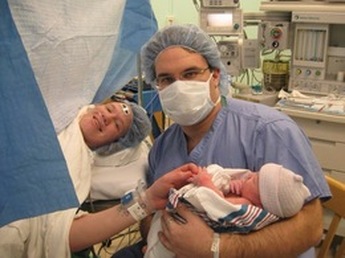 Our First Family Photo (1/24/11): I was crying. Right before this photo was taken, my then fiance brought the baby over for my first look and said to me, "I think we need a car seat." Until that point, we hadn't decided that we would be parenting vs. my placing the baby for adoption as I'd been planning through my pregnancy, so this picture is incredibly special to us. I was so incredibly blown away that my best friend had fallen in love with our son so completely before I'd even had a chance to lay eyes on him.  The problem wasn't my body wasn't the c-section or the recovery afterwards, what actually "upset" my faulty collagen had started long before the surgery as my body was moving through the stages of pregnancy and preparing for labor. All the low-back pain and hip problems I'd been writing off as pregnancy-related weren't actually -they were foreshadowing. The problem began to show itself in the weeks after the birth when the low-back pain from the pregnancy (it had crept up right around the eighth month) had never gone away... by early summer it had gotten so bad I was at my GP asking for pain medication and MRI and x-rays. Disappointing and confused by "minor arthritic change" being the only notable thing, I couldn't understand why my pain was only getting worse. And spreading. It seemed like my knees, my ankles, my shoulders... one at a time, every joint in my body was starting to slip out of place, to sit funny - I'd dislocate a hip during sex (sorry for the TMI, but I promise, no one was more traumatized than we were!) - I'd step down a step only to find that my ankle had slipped out of place and end up in a heap on the ground.... something was very wrong and it wasn't related to my now months-gone pregnancy. By now my son was standing on his own, and I was becoming less and less able to stand on my own, even sitting up for long periods was excruciating. While he was having tummy time, all I could do was lay flat on my back on a heating pad, taking twice the recommended dosage of Advil and nothing was helping. Finally, almost a year after my son's birth- after various referrals and two orthopedists who told me that nothing was horribly wrong with my back, I saw an orthopedist who was able to give me some REAL answers. (For the record, my husband had already come to the right conclusion) But for me, this was a real specialist, who I really trusted, who could explain what no one else had figured out: I have Ehlers-Danlos Sydrome, Type III. Otherwise known as Hyper Mobility Syndrome, it's a genetic condition that causes faulty collagen, which is otherwise known as the glue that holds us all together. So here I was, feeling as if I was coming apart at the seams... and I really WAS! As upsetting as it is to have a genetic disorder and no hope for a cure - everyone I know who has been diagnosed to this day is just glad that they finally have answers. Being told that it's not real, that it's all in your head - it's demeaning, it's downright abusive. To have doctor after doctor treat you as if you are a head-case while your body is being racked with such severe pain that your quality of life is becoming non existent, you just don't understand what that's like until you're living it. I was just glad to have something I could go home and Google, to read about, to learn about, to learn to cope. The first stage of accepting this condition is knowing you have it - so at least I had that. And for the record, I really have to thank my orthopedist Dr. Levy from Sprains Strains and Fractures in Cherry Hill, NJ because he's an amazing person and he really may well have saved my life, because up until the point where I started getting proper treatment for this incredibly painful condition, it was not looking good for me. I spent the first few days after the diagnosis in tears- at first I was terrified I had Type 4 (Vascular EDS, which is often deadly) - I do not, I have type III. But still -this has no cure. It's a lifetime of pain. The dislocations will never go away, they will never stop - surgery won't help. This is a condition you manage and learn to live with - but it's not something that you can change because it's faulty genetics. And worse... I could have passed it to my son. But now you know the end of the story, and you didn't really find out HOW I went from being a healthy happy 130 lb police officer to a 185 lb disabled woman with a three year old son... so let me explain how pregnancy (and later, an inept moron of a doctor at Virtua Hospital in Voorhees) destroyed my body... (but first let me say... even had I known that this would be the outcome... we wouldn't trade our son for the world.) 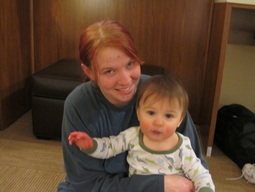 HOW PREGNANCY CAUSES EDS SYMPTOMS TO GO AWRY ... The relaxin hormone floods a woman's body at the end of pregnancy to prepare her hips and pelvis for birth - unfortunately that hormone loosens up ALL your joints, not just your hips and pelvis. A healthy women's body will slowly tighten back up, and her lax joints from pregnancy hormones will slowly go back into their normal place after labor as the healthy collagen does it's job after the pregnancy is over. Unfortunately, my defective collagen couldn't help my body go back to where everything belonged. The pregnancy set me up for a lifetime of joint dislocations each and every time I move, even ever-so-slightly, the wrong way. If I reach for something in front of my, my shoulder can drop out of the socket. When I roll over in my sleep, my hip often slides in and out of socket more times than you flip your pillow to get to the cool side. Every joint in my body regularly dislocates, except oddly, my elbows, which seem to have remained free from the effects of my hyper-mobility. Everything else in my body is affected; my jaw broke during surgery to pull my wisdom teeth, my fingers dislocate from typing, writing with a pencil is physically painful, my wrists snap from picking up my cell phone to look at my text messages, toes slide out of socket and are so cramped and painful the only way to put them back in place is to get on my feet and apply pressure to them with my whole body to "re-set" them into place, my ankles drop if I try to run (that's a joke - trust me, there's no running going on here!), my knees dislocate from staying bent on an airplane or at a movie, and more than anything, my hips. My hips are why I walk funny - they are why I'm in horrible pain as i type this blog, they are why I can't sleep, why my back is constantly a huge tangle of painful knots. My hips are the bane of my existence... That's what the collagen disorder, EDS Type-III is, after-all. As a child, they put these awful bar-shoes on my feet to try to stop me from "toe-ing in" as they called it. Doctors told my parents not to worry and that I'd "outgrow it" and not one specialist was concerned that I can rotate my feet well over 180 degrees inward, even walking with my feet facing forward and backward at once. Here's a photo to illustrate. And here's one that shows what I can do standing up... It's quite typical for woman (and their doctors) to only put together all the puzzle-pieces of a lifetime of "little things" together after a pregnancy, when all the damage done by the relaxin begins to cause chronic pain. And that's what happened to me. HOW LEVOQUIN AND CIPROFLOXIN CAUSED ME PERMANENT INJURY AND A LIFETIME OF PAIN... One of the biggest things that contributed to my life-long battle with chronic-illness (in addition to the pregnancy that triggered the onset of severe symptoms) - was 100% the fault of Virtua Hospital and the HORRENDOUS admitting doctor who was put in charge of my care there. (*Please see the foot-note to this story) That's a story for another time, but I promise I'll tell it. There is some debate about the facts - but this we know for sure: Shortly after my son's birth my husband and I both were diagnosed with Mono (well, to be fair, he had Mono, I was battling with the Epstein-Barr virus as I have immune system issues we didn't yet know about). My husband became jaundiced and was hospitalized, I had an IV infiltrate and and had a serious issue with cellulitis I began to battle with nearly permanent urinary tract infections and kidney infection symptoms. I had sharp pelvic and abdominal pain, pain in my low back near my kidneys, burning and the constant feeling of needing to pee.... it was never-ending and so severe that I went to the ER nearly a dozen times because absolutely nothing would reduce the pain short of IV morphine or dilaudid. It became unbelievably bad during my periods, after sex, after bathing, swimming... I did everything possible to avoid UTI's - literally followed the handbook to a T - including giving up sex for quite a while despite the fact that I was newly married and very much in love. Nothing I did helped. I was admitted to Virtua Hospital more than nine times in the year after my son was born, and several more times in early 2012. During the first few hospitalizations, I was told that I had MRSA in my kidneys... MRSA is a HIGHLY infectious staph infection. It HAD to have been given to me during a cathaterization... and up until that point I'd had exactly ONE catheter in my entire life: DURING MY C-SECTION... at Virtua Hospital. Isn't that nice? I was treated like a bio-hazard. Everyone who came into my room suited up as if I was an E-Bola patient and even friends and family were supposed to wear gowns, masks and gloves to come see me. My newborn child who I'd care for at home, skin to skin, I was told was not allowed to visit me in the hospital (they got WW-III about that, and I won, btw.) I missed my own baby shower (it was after my son's birth) because I was in the hospital, and I was in quarantine, so they wouldn't even let me guests visit me. So the onslaught of antibiotics started. They pumped me full of antibiotics and I never began to feel better - only worse. The only thing that ever seemed to help the UTI symptoms was over the counter AZO (which I still use to this day on a regular basis) - even the various antibiotics didn't keep the infections at bay for more than a week or two. Some of my hospitalizations were LITERALLY just days after I'd been released. I was repeatedly treated with two strong antibiotics: Levoquin, and Ciprofloxin. Each time I would get a bag of IV antibiotics, the pain would come. I felt as if they were pumping wet cement into my body and it felt as if every joint was hardening to a solid. I felt like I couldn't move - the fire-y pain that shot through my veins was worse than the broken jaw, worse than third degree burns, WAY worse than the c-section, even worse than the bowel impaction and intestinal tears I'd survived... it was HELL. I reported to the nurses my horrible pain. Occasionally a doctor would up my dilaudid from every 6 hours to 4, or add Vicodin on top of my morphine, but nothing was ACTUALLY helping. I was just getting sicker and no one knew why. I'll tell you another time about the world war that went on between the doctors and I, but suffice to say that if a hospital can't explain your symptoms, they have two responses... 1) They'll tell you that they don't believe you're actually sick because your symptoms "don't make sense" or because nothing you're complaining of is showing up on their tests.... and they'll discharge you, even if you have VISIBLE symptoms, such as bacteria or an infection they can confirm.... they'll discharge you, after having you on anti-inflammatory medications, pain medications, antibiotics, probiotics and ran a whole bunch of tests.... and they'll send you home with NOTHING. The hospital will flat out tell you that they don't know the answer and that they "can't keep you here forever" and will simply send you home with NO answers. 2) They'll imply that perhaps you have a mental illness, that the pain is in your mind, or worse, that you are simply there seeking pain medications because you are a drug addict. I repeatedly told the doctor after being trearted with antibiotics that I was experiencing SEVERE and worsening pain... and in response, the admitting doctor flat out accused me of "drug-seeking behavior" claiming that my report of pain made NO sense and COULDN'T be true. (*Please see the foot note below about the serious affects of the Fluoroquinolone family of antibiotics.) *I was accused of this once - by the same idiot doctor I mentioned above and in the blog post (here). Why? Because at the time, in her words "No one being treated for a kidney infection SUDDENLY has sharp severe pain in her hip, shoulder and lower back. It makes no sense." Seven months later, a black-box warning was added to the Fluoroquinolone family of antibiotics- including LEVOQUIN and CIPROFLOXIN. Read more about this in the footnote or (here). Basically what it comes down to is this- SEVERE PAIN as a side-effect of those antibiotics is a sign that something is VERY very wrong. And she continued to treat me with those same drugs, over and over and over, all the while, claiming that I was "over reporting" my pain and wasn't being truthful. In the end, her ignorance and ignoring my reports of pain, ended in PERMANENT damage to my joints, throughout my entire body, that I now have to live with forever. . ** Footnote Regarding Fluoroquinolone Antibiotic **
Approximately 7-9 months after I was accused of lying when I reported severe pain during and after IV antibiotic treatments - the FDA released new Black Box warnings about the SERIOUS dangers associated with these antibiotics. Here's the information from the FDA. Warning: Fluoroquinolone Antibiotics May Cause Permanent Nerve Damage. “The U.S. Food and Drug Administration (FDA) has required the drug labels and Medication Guides for all fluoroquinolone antibacterial drugs be updated to better describe the serious side effect of peripheral neuropathy. This serious nerve damage potentially caused by fluoroquinolones may occur soon after these drugs are taken and may be permanent... Peripheral neuropathy is nerve damage in the arms and/or legs, characterized by “pain, burning, tingling, numbness, weakness, or a change in sensation to light touch, pain or temperature, or sense of body position.” Due to their tremendous health risks, fluoroquinolones should be reserved for treating serious bacterial infections that won’t respond to any other treatment, when the patient is made fully aware of the potential for serious adverse events. Instead, they’re often inappropriately prescribed for mild conditions like sinus, urinary tract and ear infections. In fact, fluoroquinolones are among the most commonly prescribed antibiotics in the United States. I highly recommend you take pause before filling a prescription for these drugs, especially if you have a “routine infection” that has not been treated by other agents that have a safer side effect profile. You should not expose yourself to this degree of risk unnecessarily! The dangerousness of fluoroquinolones definitely warrants some serious discourse with your health care provider about whether they are really necessary, versus safer treatment options. And that's how it went throughout my twenties... I'd gain a little weight here and there (on my first trip home, five months after I turned 21, my mom was shocked to see me at close to 135 lbs.... but empty calories at the bar will do that. I'd officially gained my freshman fifteen! But that same year, when I returned home for Christmas, I was back in my size three jeans and back around 115 lbs. When I entered the police academy in August 2004 I weighed all of 114 lbs at weigh-in, and an eight months later at graduation, I was in the best shape I'd ever be in (This after two dozen asthma-attacks, an encounter with capsaicin (which I'm allergic to, and ended up using an epi-pen for the first time), a broken toe that I continued to do push-ups and run on, with a VERY aggravated bone spur in my right shoulder, and that i had done P/T for months through HUNDREDS of hip, shoulder, knee and ankle subluxations and dislocations) - I was 124 lbs, mostly muscle, yet even so- I had FAR less muscle tone than a single other person in my academy class, even those who had started out over weight. I was just incredibly proud to have graduated. 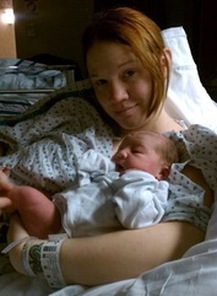 It never made much sense that I was so much weaker - so much more easily injured than everyone around me, but I just presumed that it was just who I was. I still didn't know that my entire body was made of defective collagen and that graduating from the police academy, and keeping up with those around me was probably 200 times HARDER for me than it was for anyone around me. After all, other people's bodies don't have to exert a ton of energy just keeping their joints from sliding out of socket while they are sitting still. Ah... EDS. Ah... to be so young and naive. When I got pregnant with my son, I was 29 years old - he was born January 24th, 2011 at 8lbs 10oz via a c-section and it was one of the greatest moments of my life - even though everything about my pregnancy ultimately set the ball rolling for all of my medical conditions to come crashing down on me at once. (Although my pregnancy did have a big part in helping put my Crohn's Disease into remission, so I can't forget to be thankful for that.) My EDS became a full-blown thing, debilitating me and causing my activity levels to slow down to from being a full-time police officer to unable to work at all in a matter of the nine months I was pregnant with my son. Despite the increasing pain, and what would eventually lead to the diagnosis of all my main medical issues - just five days after my son's birth, I went back into my size five jeans, and I remained around 135 lbs until early 2012.... Not long after I started on pain-management, on muscle relaxors to help control the ever-present and extremely painful muscle spasms, and right around the time when my thyroid quit working, I began to gain weight, and began to gain it rapidly. At first, I was shocked to be 150 lbs, but thought it was post-baby weight and it would slowly come off. Despite my appetite slowing down more and more to the point where I'd often go days without eating... in a period of approximately seven months, I skyrocketed to 195 lbs. I have been fluctuating between 180-196 lbs since 2012 and I can't stand myself for it. I avoid photographs, I no longer get (or show anyone) my tattoos, I'm mortified by my once tight, slim and frankly, beautiful body and I don't feel like myself. I used to be the center of photos, and now I avoid going out because I can't stand the chance of being in a photograph. I hate that I take eight thousand photos of my now three year old son, but that almost none of them include much more than my face. I have tried everything within my power - I often don't eat for days on end, or eat nothing but fruit. I've tried to go back on my ADHD medication which has always in the past lead to weight loss, but nothing I've done has helped. I got to about 185 lbs and stagnated, a few years into living with EDS, and I'm hell bent on doing something about it. But before I could - I felt that I needed to write the back story because a weight-loss journey is so personal, and so individual. I have no idea what it is like to be a person with genetics who makes them pre-disposed to carrying weight. I come from a thin family, and inside, I know that there's a thin person - ME - who is DYING to get out of this body that I'm trapped in, and get back to living my life. This is my "before". This is the last time I will ever look like this, no matter what it takes to change things. I don't want to be 114 lbs again, but I WILL get back under 140, and it will happen within 2015. I can't change living with chronic illness, but I'll be damned if I'm going to spend the rest of my life more depressed about my weight than the chronic pain and diseases that caused it. <3 K This has GOT to go: I need to get back to THIS version of me:
|
AuthorLife at 34, as a mother, a wife, a daughter, a friend... with Ehlers-Danlos Syndrome, nothing is easy..but it *IS* worth it. Archives
November 2019
Categories
All
|

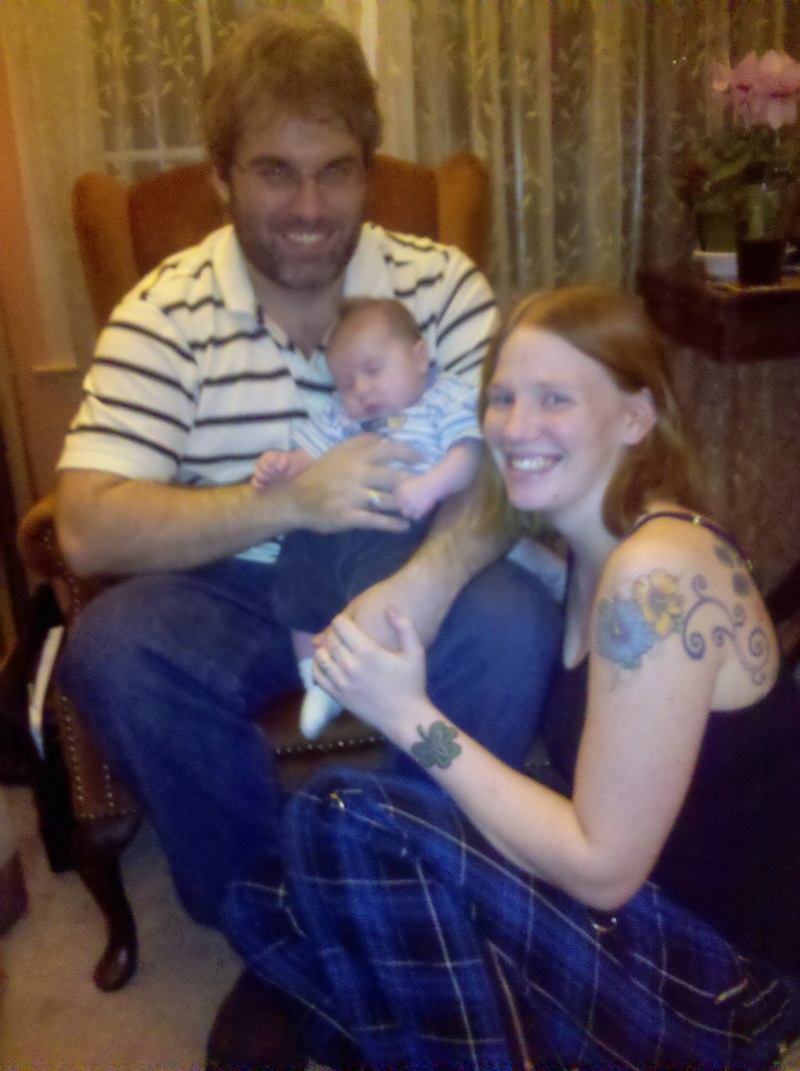
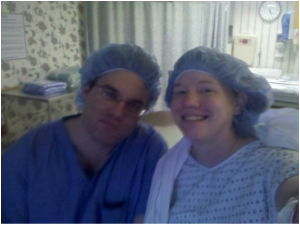


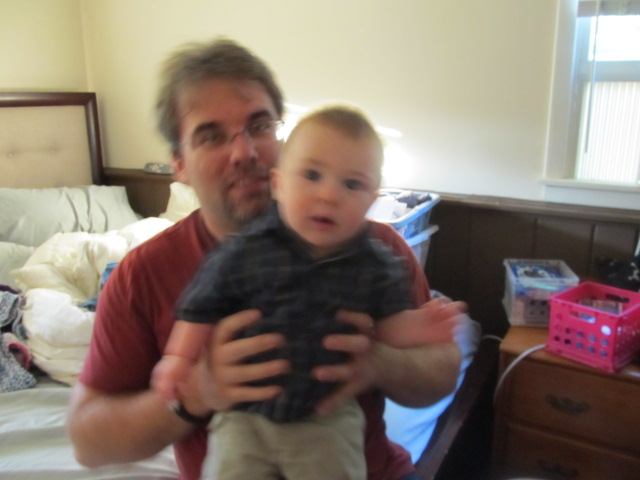


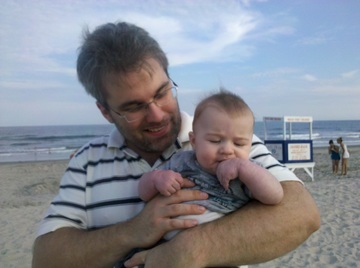
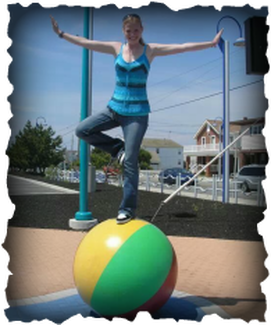








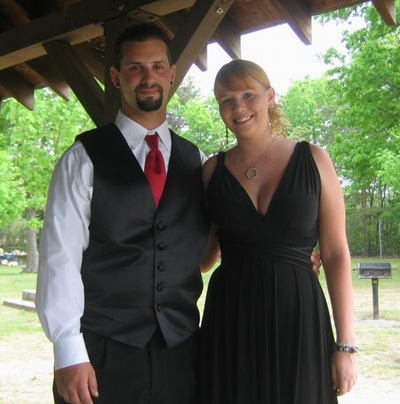
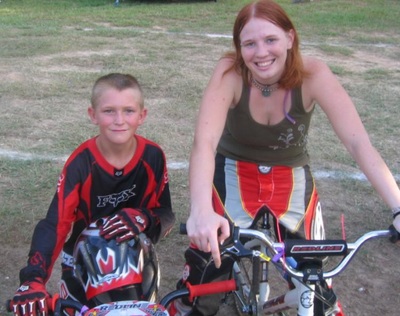

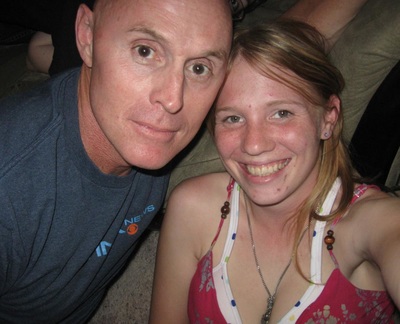

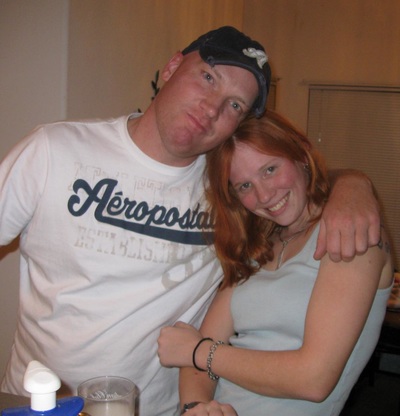
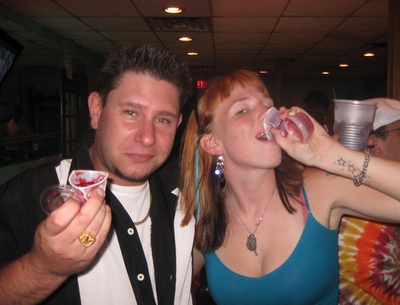

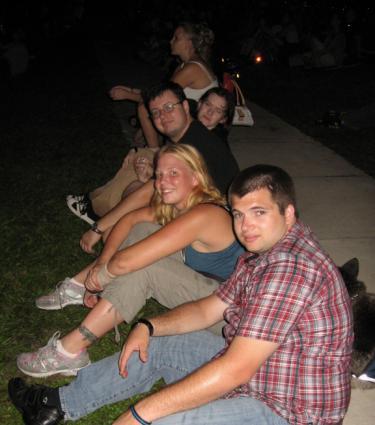




 RSS Feed
RSS Feed